5 Volumes
Invaders of Pennsylvania
For a peaceful state, Pennsylvania has suffered many invasions. It's all been one-way; Pennsylvania has never invaded anyone else.
Philadephia: America's Capital, 1774-1800
The Continental Congress met in Philadelphia from 1774 to 1788. Next, the new republic had its capital here from 1790 to 1800. Thoroughly Quaker Philadelphia was in the center of the founding twenty-five years when, and where, the enduring political institutions of America emerged.
History: Philadelphia and the Quaker Colonies
Philadelphia and the Quaker Colonies
Pre-Revolutionary Ben Franklin
Poor Richard was able to retire at the age of 42, and spent the rest of his life as a rich man, dying at the age of 82 with an eye-popping estate.
Causes of the American Revolution
Britain and its colonies had outgrown Eighteenth Century techniques of governance. Unfortunately, both England and America lacked the sophistication to make drastic changes smoothly.
On the timescale from 1492 to the present, 1776 lies about half way. Somewhere along that timescale, in the two decades after the French and Indian War, the British North American colonies woke up to their emerging destiny of eventually becoming larger and stronger than the home country. In itself, that was no reason to break apart, and the middle, or Quaker, colonies did largely adopt an "If it ain't broke don't fix it" attitude.
New England felt it had more serious maritime and manufacturing grievances however, and the Old Dominion of Virginia was agitated by land speculators who chafed to put stakes in Ohio land, on the far side of the Proclamation Line of 1763. It was probably only a matter of time before the Yankees and the Cavaliers had a collision with a rather obtuse and arrogant monarchy in London. Although they could scarcely be expected to recognize it fully, Britain/Pennsylvania relations after 1755 were a contest of possibilities.
The British government would surely become more enlightened about its colonies if the middle (Quaker) colonies just continued to remain placid. But very likely, immigration of non-Quakers and non-Englishmen might make the Quaker colonies less loyal and more combative, tempted to join with neighboring colonies in a unified rebellion. It was the task of the hotly beleaguered New Englanders to win over the Quakers quickly, while Burke and other Whigs in Parliament tried to win the ministry before a show-down was forced. Hotheads, however, won the race.
But the hotheads had some help from general historical circumstance. New England and Virginia had experienced comparatively little threat from the French, the Spanish or the Indians in the Eighteenth century; Pennsylvania got it worst, so it valued protection more. Add to that the pacifist Quaker influence, and the result was Pennsylvania, New Jersey and Delaware were least ready to abandon British protection but were so economically important that revolt was impossible without them.
Enlisting the Quakers and the religious Germans into starting a war was a near-impossibility. The Scotch-Irish and others under the political leadership of Benjamin Franklin were more instinctively combative, but Franklin their leader was staunchly pro-British right up to a few months before the Declaration of Independence. It took the arrogance of a few swaggerers in the British government to humiliate Franklin in public, but that proved enough to do it. Everybody was telling Franklin he was the most wonderful genius alive; one can scarcely blame him for believing it a little. Forty minutes of vitriolic, witty, malicious public snottiness in front of Burke, Voltaire and the assembled aristocracy was just about too much for the fat old, gouty old -- most remarkable man then alive.
After that, it was going to be war.
FORCES AT WORK
Three Different Ways of Looking at the American Revolution. If you are a resident of nearby Boston, the American Revolution began on April 19, 1775, at Lexington and Concord for reasons having to do with smuggling and tea. If you live near Philadelphia, the chances are fairly good you believe the Revolution began on July 4, 1776, because Admiral Howe attacked us. What's this all about? The colonies had fought the French and Indian War loyally together, with George Washington at Fort Necessity and Ben Franklin supplying wagons to General Braddock with his own money, against the hated French and their Indian allies, English colonists fighting off the enemy, side by side from 1754 to 1763, even back as far as traveling together to the Albany Conference in 1745. Ben Franklin drew the first newspaper cartoon, Join or Die, at that time, and first proposed an alliance of the thirteen English colonies with the homeland. The Quakers would probably still dominate Philadelphia, if they hadn't chosen religious consistency over the dictates of power. And yet a few years later the British were chasing gunpowder stores around the countryside. The British wanted the Americans to help pay the cost of their own defense, but we were all Englishmen, together, and everybody wants something for nothing. New Englanders wanted a negotiated arrangement like Ireland or union like the Scots; these were only technical details.The slogan aimed at representation, not independence. "No taxation without representation" for English-speaking colonists. Eventually, they hoped for parliamentary membership. They were mainly fighting against mercantilism using taxation as a weapon to fend off taxes while they remained English settlers. Franklin wanted a little more, moving the capitol to America because it was biggest, and he nursed this view until King insulted him in person,a few weeks or months before he grudgingly returned to America to help lead the Independence movement.
But this is the story of the forming of the Constitution, and in the fight to remain untaxed, English settlers got left behind and will be left to drift along. Got left behind by the Treaty of Westphalia. Everyone hates to be persuaded of something which hurts his self-interest, and Westphalia said the land became private property if the King had the exclusive right to adjust the borders, and by implication the local religion. That may have been useful in dealing with Indian lands, but in the sixteenth century, people took their religion pretty seriously. That was a serious matter, and it was made worse for Protestants as a consequence of Catholic activity in which Protestants played no role. Even worse, it was accepted by an English King who was German about whom Episcopal Englishmen had some reservations. And still worse was to see German Hessian soldiers about to do most of the fighting arriving in the troop transports, paid for by a German King, enforcing a law most of them didn't understand which had unexpected twists to it which sounded like the fight they ware already fighting about taxation without representation. Remember, Ben Franklin only had a second-grade education, and most of the colonists couldn't read and write. There were only a handful of lawyers in America, and most of them had a conflict of interest about this subject, which was cataclysmic in its sweeping implications. The logic of the new German law which only a few lawyers could follow sounded like a trap. The lawyers back in England at the Inns of Court might explain it, but the essence was that rebellion was punishable by hanging, while Independence was settled by treaty. The colonists might not understand how they got into this fix, but the new legal situation created a much worse punishment for rebellion than for Independence, and hence a strong incentive to prefer Independence. Admiral Howe was only 90 miles away with dozens of warships and hundreds of troop transports, and the Continental Congress was in Philadelphia with the power to make a choice. The Germans had just experienced a large wave of immigration, more German soldiers were sitting in the transports, anxious to obey the orders of a German King, which started as a law passed by other Germans without a vote by any of the colonists affected, starting fight a war about taxation without representation, which hardly anyone had the education to understand. It was, so to speak, a perfect storm. We came very close to losing that war, so after three centuries it is still true: Whether it was the League of Nations or the United Nations, or changing the Health System -- you have a hard time convincing the American public that it's a good idea to follow he decisions of non-American leaders. If the idea was foreign, and particularly if control is left in non-American hands it's going to be a hard job persuading Americans to vote for it. england
Whatever Was George III Thinking?
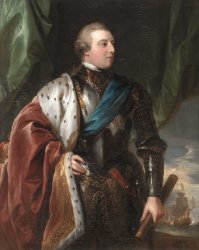
|
| George III |
Two troubling questions persist long after the American Revolution has mostly faded into the past: Why was New England so much more rebellious than the rest of the colonies? And, whatever was George III thinking when he blundered into losing an empire? No doubt, he would have answered in a different, unreflective tone in 1776, but the following is what he had to say about it after the war was lost. He seems to emerge as a far more literate and reflective person than the colonists believed of him.
"America is lost! Must we fall beneath the blow? Or have we resources that may repair the mischief? What are those resources? Should they be sought in distant Regions held by precarious Tenure, or shall we seek them at home in the exertions of a new policy?
"The situation of the Kingdom is novel, the policy that is to govern it must be novel likewise, or neither adapted to the real evils of the present moment or the dreaded ones of the future.
"For a Century past the Colonial Scheme has been the system that has guided the Administration of the British Government. It was thoroughly known that from every Country there always exists an active emigration of unsettled, discontented, or unfortunate People, who fail in their endeavors to live at home, hope to succeed better where there is more employment suitable to their poverty. The establishment of Colonies in America might probably increase the number of this class, but did not create it; in times anterior to that great speculation, Poland contained near 10,000 Scotch Pedlars; within the last thirty years not above 100, occasioned by America offering a more advantageous asylum for them.
"A people spread over an immense tract of fertile land, industrious because free, and rich because industrious, presently became a market for the Manufactures and Commerce of the Mother Country. Importance was soon generated, which from its origin to the late conflict was mischievous to Britain, because it created an expense of blood and treasure worth more at this instant if it could be at our command, than all we ever received from America. The wars of 1744, of 1756, and 1775, were all entered into from the encouragements given to the speculations of settling the wilds of North America.
"It is to be hoped that by degrees it will be admitted that the Northern Colonies, that is those North of Tobacco, were, in reality, our very successful rivals in two Articles, the carrying freight trade, and the Newfoundland fishery. While the Sugar Colonies added above three million a year to the wealth of Britain, the Rice Colonies near a million, and the Tobacco ones almost as much; those more to the north, so far from adding anything to our wealth as Colonies, were trading, fishing, farming Countries, that rivaled us in many branches of our industry, and had actually deprived us of no inconsiderable share of the wealth we reaped by means of the others. This comparative view of our former territories in America is not stated with any idea of lessening the consequence of a future friendship and connection with them; on the contrary it is to be hoped we shall reap more advantages from their trade as friends than ever we could derive from them as Colonies; for there is reason to suppose we actually gained more by them while in actual rebellion, and the common open connection cut off, then when they were in obedience to the Crown; the Newfoundland fishery took into the Account, there is little doubt of it.
"The East and West Indies are conceived to be the great commercial supports of the Empire; as to the Newfoundland, fishery time must tell us what share we shall reserve of it. But there is one observation which is applicable to all three; they depend on very distant territorial possessions, which we have little or no hopes of retaining from their internal strength, we can keep them only by means of a superior Navy. If our marine force sinks, or if in consequence of wars, debts, and taxes, we should in future find ourselves so debilitated as to be involved in a new War, without the means of carrying it on with vigor, in these cases, all distant possessions must fall, let them be as valuable as their warmest panegyrists contend.
"It evidently appears from this slight review of our most important dependencies, that on them we are not to exert that new policy which alone can be the preservation of the British power and consequence. The more important they are already, the less are they fit instruments in that work. No man can be hardy enough to deny that they are insecure; to add therefore to their value by exertions of policy which shall have the effect of directing any stream of capital, industry, or population into those channels, would be to add to a disproportion already an evil. The more we are convinced of the vast importance of those territories, the more we must feel the insecurity of our power; our view, therefore, ought not to be to increase but preserve them."
In short, King George III of England sounds like a thoughtful, insightful man. Not a heedless, vindictive power freak as portrayed by frenzied revolutionaries, the King expressed a pretty reasonable assessment of his colonies. What he most lacked was a recognition that centralized if not one-man rule blocked growing expectations of greater self-rule; expectations propelled by an even bigger revolution, the Industrial Revolution. A Machiavelli or a Bismarck would have seen that Virginia mostly wanted access to Ohio land, while New England wanted maritime dominance; the Quaker colonies were quite satisfied with what they had. It would have been comparatively simple to play one region against another, giving each a little of what it wanted while encouraging cultural diversities which kept them jealous and separate. But His Majesty, yielding to the financial strains of the Seven Year War, and the urgings of his Teutonic mother, united thirteen of his colonies in common rebellion against taxes, military occupation, and high-handedness. The colonies did not want to unite; George III united them. Without unity, their rebellion had no chance.
Parliament Provokes a Revolution
In some medical circles, it is postulated that George III was psychotic, possibly suffering from an inherited rare condition called porphyria.
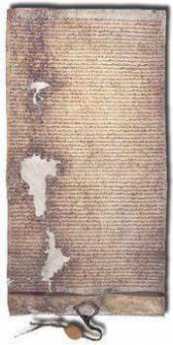
|
| Magna Carta |
That's pretty conjectural, but it is certainly true that his mother egged him on to be a real king, a real force reversing that steady decline in the Monarchy's personal power which began with the Magna Carta. By the time in question, however, so much power had already gravitated into the hands of Parliament that the King could not act in any major way without their consent. Even today, Cabinet Ministers are spoken of as King's ministers but are in fact appointed by leaders of the majority party in Parliament. Some in Parliament, like Edmund Burke, were almost persuasive in resisting the Ministry, urging colleagues to seek reconciliation with the colonies. George III did still retain the power to appoint his favorites to important positions and used this patronage extensively to control the country. Political party chieftains, on the other hand, retained and retain today the power to nominate the party candidate for Parliament in any particular district. The leadership thus selects the members of Parliament, who can, in turn, overturn the leadership only if they dare. Real decisions were largely in the hands of party chieftains, but perhaps to some extent, the Crown, depending on the Monarch's shrewdness in distributing patronage among the party chieftains.
Across thousands of miles of dangerous ocean, the English colonies had changed from the weedy wilderness in the Sixteenth century, into thriving and prosperous small civilizations in the early Eighteenth. Transatlantic communication did not substantially improve in that interval, but colonial population grew to over a million, many of them native-born in the colonies, with increasingly large numbers of immigrants from other nations. Loyalty to the Monarch inevitably declined. True, they spoke English, revered England, but many urgent local issues were difficult to administer at such a distance, encouraging a mentality of self-governance. France, by now at war with England on the Continent, operated on a grand plan of interior encirclement, from Quebec and and Great Lakes, down the Mississippi to New Orleans. The English coastal settlers needed peace with the Indians of the interior;
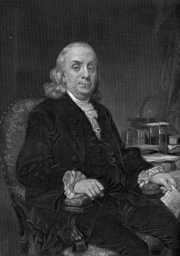
|
| Benjamin Franklin |
the French did not scruple to stir up massacres and Indian warfare. All wars are expensive, the French and Indian war particularly so. After defeating the French, the British were put to the protracted expense of building frontier defenses. Although the British were anxious to attract English-speaking colonists who would defend America for England, it was obvious some of the settlers were becoming very rich. Surely these people could not object to paying taxes for their own defense. In retrospect, it seems remarkably naive of the British to think it was that easy. Americans did not want to pay taxes because they did not want to pay taxes. They settled on the stance of "No taxation without representation" and like Franklin and the Penn family, many really believed in it. That slogan was particularly effective after it became apparent that Parliament wasn't about to give remote colonists reciprocal power in Parliament to interfere with affairs in the British Isles. With Parliament adamantly refusing to dilute its own power, "No taxation without representation" was a neat rhetorical box which meant, "No taxation." Contemporary English historians now throw up their hands in despair that so few members of George III's government had Burke's vision or even the normal wiles of diplomacy. But that understates the hidden political agenda. Parliament just pushed ahead with fairly nominal taxes, but they did so to curtail the independence of colonial legislatures.
The Stamp Act of 1764. It could be argued that Navigation Acts nothing new; earlier versions were first passed in 1651, intended to thwart Dutch trading. They prohibited foreign trade with the British home islands. After fifty years in 1703 similar restraints were extended to trade with the colonies, particularly molasses in the Caribbean area. No outcry was made as these restraints, aimed at retaining the Britishness of British colonies, were occasionally modified and extended over the next sixty years.
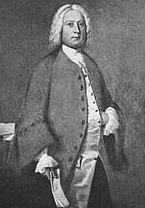
|
| Thomas Penn |
After a century in 1764, however, the Stamp Act was passed, producing modest revenue but imposing a crippling set of headaches by requiring special papers to transact private business. The uproar was enormous and legitimate, focused mostly on the tangle of red tape needlessly imposed. By shifting taxation from trade to paperwork transactions, suspicions were plausible that the Ministry was scheming something obscure. The Stamp Act was hastily repealed, even before Benjamin Franklin and Thomas Penn recognized its unpopularity and were still to some extent defending it in 1766. Franklin apparently saw the Stamp Act as an opportunity to appoint his friends as stamp agents. Local uproar in Pennsylvania was apparently orchestrated by William Bradford, who in addition to having been Franklin's former competitor in the printing business, was the owner of the London Coffee House at Front and Market. No other prominent colonial leader seems to have been involved in the agitation, and it is remotely conceivable that uproar originated with Bradford alone. More likely, Bradford was merely an opportunist in a genuinely popular uprising. With the familiar maneuvering characteristic of politicians, Franklin took popular credit for defeating the Stamp Act with some skillful criticism of it, while John Penn gained credit with the King for representing Pennsylvania's relative calm about it, compared with other colonies. In Pennsylvania at least, the uproar quickly subsided after the repeal of the Act.
The Townshend Navigation Acts of 1768.In 1766 the Grenville Ministry was replaced by that of Rockingham, then soon by Pitt, who were anxious to disavow the unpopular Stamp Act, but nevertheless needed colonial revenue, and needed a few unpleasant laws to prove that Parliament could not be intimidated by colonial squawking.
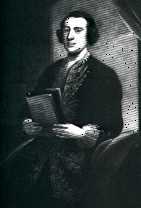
|
| Charles Townshend |
Charles Townshend, the brilliant, vindictive, Chancellor of the Exchequer then proposed taxes on glass, painter's lead, paper, painter's colors, and tea. The underlying political purpose of these taxes was to provide revenue for paying British colonial administrators directly, rather than depend on the Colonial legislatures to pay them. The Legislatures had long played a game of withholding payments, sometimes even the salaries of Judges and Royal Governors, when they disapproved of projects devised in London. The very predictable uproar provoked by the Townshend Acts propelled John Dickinson into prominence with a pamphlet called Letters From a Pennsylvania Farmer, which popularized the idea of "nonimportation", essentially a boycott of British products. Unintentional nonimportation was in fact the effect of the laws, clogging the ports with paralyzed trade goods. Rather than Dickinson's lofty principles, a little-noticed act of 1764, prohibiting the printing of paper money, paralyzed trade. There simply was not enough available coinage to pay these taxes, which finally pushed the primitive transaction system beyond its capabilities. From the viewpoint of modern economics, a heavy unbalance between imports and exports could not be rebalanced by flows of capital. The disastrous Townshend Acts were mostly repealed in 1770, but the British government was getting in deeper and deeper, discrediting itself at every turn. To retreat but still save face, they repealed all the taxes except the one on tea.
The Tea Act of 1772. To a certain degree, the uproar over the face-saving tax modifications on tea was a pretext for confused but radical colonists who were spoiling for a fight about difficulties they tended to personalize. The act actually lowered the effective taxes on tea, and at first Whig radicals were hard put to find a reason for outrage about lowering the price of tea. However, Bradford and his London Coffee House cronies (Mifflin, Thomson) were imaginative, and soon stampeded a mob scene in Philadelphia, where for a time the populace had seen nothing to get worked up over. Rush and Dickinson joined the chorus; the public feeling was stirred to a frenzy not easily reversed.
The really substantive issues involved were created by several years of Townshend Duties and other forms of import restriction. Laws to ensure the Britishness of British colonies created pleasant opportunities for colonial artisans and craftsmen, difficult hardships for importers. But these dislocations, whether welcome or unwelcome, firmly exposed the underlying truth that they caused all colonists to pay higher prices for goods. Adam Smith was not to publish his Wealth of Nations until 1776, so in this case the proof preceded the theory. The colonists were effectively asked to pay higher prices for everything, in order to increase Britishness and to billet soldiers they could not command. Once that cat was out of the bag, attitudes could never be the same. On the English side of the ocean, the question was framed as colonist unwillingness to contribute to the cost of their own defenses. The two slanted perceptions hardened to the point where arrogance confronted defiance, suggesting combat to both of them.
In the case of tea, taxes and import restrictions were intended to promote English tea over Dutch tea; in fact, they stimulated smuggling. Smuggling grew to a point that vast quantities of tea were stranded in the warehouses of the British East India Company, and trade balances of the British Empire were undermined. By reducing taxes, Parliament made East India tea cheaper than smuggled tea. Going perhaps one step too far, middle-men in the tea import business were cut out of the loop by appointing favored direct agents. In Philadelphia, those were Henry Drinker and Thomas Wharton. Bradford and his group immediately set about intimidating these merchants with threats to burn them out, and the sea captains who worked for them, with threats of tar and feathers. The age of Reason was leaving Reason behind.
Addressing The Proprietors' Dilemma
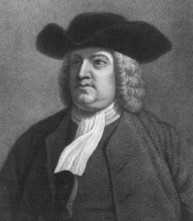
|
| William Penn |
DURING the century which elapsed after Charles II gave away Pennsylvania to William Penn, several hundred thousand people moved in and changed the place. Transformation of the wilderness explains why the terms of the grant seemed logical at one time, but proved almost impossible to manage at the time of the Revolution. The Penns with thirty million acres was the largest landholders in America but, in fact, by 1776 only five million acres had been sold in a century. The land they held was simply too much for one family to handle without an army, and although the original settlers were pacifists, the later ones were combative.
Charles II had written in the Charter that the Penns could have the land if they could maintain order there, retaining the legal right for the King to recover the land if they didn't. This fall-back provision certainly reflects some doubt about the ability of pacifists to shoot the necessary number of Indians, Frenchmen, and Spaniards. On the other hand, the motive for a King delegating away his authority in the first place became clearer when the Penns experienced severe financial strain defending the Northeast corner of the state against the Connecticut invaders. It furthermore helps us understand why Benjamin Franklin received such a cold reception when he was sent to London by the colonists to request the crown to reassert civil authority over the state. That did not necessarily imply stripping the Penns of their land; by this time, it was clear that the Penn Proprietors were mainly interested in selling it to someone. The charter of the King's grant included the offer to make William Penn a King; and although the offer was declined, the Penn Proprietors retained some degree of legal power to govern the territory. Franklin for all his persuasive power was, unfortunately, the one man Thomas Penn didn't want to see, because of the threat he had posed by raising a militia in King George's War, and later his expansiveness at the Albany Conference. And Thomas was a good friend of the King. The King didn't want these problems and particularly didn't want the expense. Ambiguities were, of course, shared all around. William Penn had quite shrewdly seen it was more sensible to treat the Indians decently than to fight with them, and cheaper too; the lesson was not lost on the British crown. But the French Kings posed a much larger world-wide threat to the British colony, finding for their part, it was rather economical to supply munitions to the Indians on the frontier and stir them up emotionally. The French and Indian War was a small component of the Seven Years War, which proved to be a costly adventure for both sides. Its local cost certainly overwhelmed the ability of one family to underwrite local governance in a large wartime colony, and it jeopardized the finances of the British Monarch to carry the rest. The resulting need to tax the colonies for their defense sent things downhill, eventually to the Stamp Act, the Townshend duties, and the Tea Tax. Everyone made lots of mistakes as the whole structure underwent revision, just as pacifists are certain will happen in any war. But when a pacifist utopian colony was prospering while successfully dealing with the Indians, it's all sort of a big pity.

|
| Thomas Penn |
With much to lose, the Penn family did pretty well with the resources at hand. By the time of the Revolution, three generations of Penns had divided up ownership shares of the Proprietorship. When French and Spanish ships were marauding the Delaware River, Benjamin Franklin the local printer took it on himself to organize a militia which persists today as the Pennsylvania National Guard, the Twenty-eighth Division. Franklin was suddenly a local hero to everyone, except to one man, Thomas Penn. Thomas was the dominant figure in the Penn family for many years and worried deeply about Franklin, a man who could stir up ten thousand armed volunteers with a poster proclamation. Such a man could mean trouble, as indeed events later proved to be the case.
John Penn was the Governor of the state, residing in his mansion on the Schuylkill called Lansdowne, doing his best to ingratiate the locals. He struggled to be diplomatic when arguing for the decisions actually made by his Uncle Thomas in London. Thomas Penn, on the other hand, was an important friend of the British Ministry, and a notable person in aristocratic England. As the Revolutionary War approached, the problem transformed into how to hold on to 25 million unsold acres, while remaining unsure who was going to win the impending war.
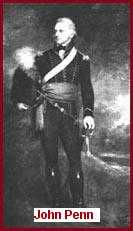
|
| John Penn |
The strategy the Penns adopted was to get out of the business of running a local government, as Franklin had proposed but in a different way. John Penn the Governor became a private citizen, just a local real estate agent. He took an oath of allegiance to the Revolutionary government, which in the chaos of the time was equivalent to becoming an American citizen. Meanwhile, other members of the family remained in England, ready to revise the arrangement if the British won the war. It was all fairly transparent straddling of the issues, which was only even remotely likely to be effective because of the enormous store of Penn goodwill built up over a century. In 1789 revolutionary France, for example, such sentimentality would not have delayed the tumbrels to the guillotine for five minutes.
Meanwhile, an unexpected difficulty was created. By withdrawing from control of the local government, the Penn family also withdrew from the defense of state borders against neighboring colonies. Under the circumstances, the Penns were afraid to appeal to the King, while the new government of Pennsylvania found the Articles of Confederation were merely a wartime tribal compact. The Articles stabilized boundaries mainly for the purpose of conducting a united war, and did not seriously contemplate a continuing judicial role for disputes between colonies. When the Revolution was finally over, the Penn Proprietors were not left with much of a bargaining position. The new State of Pennsylvania offered, and they accepted, about fifteen cents an acre to surrender their claims. In Delaware, they got essentially nothing for those three counties. Only in New Jersey did the Proprietors' claims remain durable after the new nation was established. The Proprietorship of East Jersey survived into the late 20th century, and the Proprietorship of West Jersey continues to return a small profit even today. The New Jersey curiosity is treated in a separate essay.
Monetary Causes of the American Revolutionary War
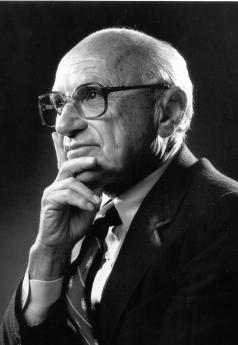
|
|
Milton Friedman The Father of Monetarism |
Milton Friedman won the 1976 Nobel Prize in Economics (more accurately, the Bank of Sweden Prize in Memory of Alfred Nobel), for generating controversial ideas made even more annoying to his professional adversaries by his matchless knack for attaching memorable slogans to them. A phrase in question is that "Inflation, always and everywhere, is a monetary phenomenon." Turned around, the converse emerges that the great deflation and depression of the 1930s was caused by a global monetary shortage. Then, to extend the same idea to the American Revolution, it could fairly be argued that inept British contraction of colonial coinage had a lot to do with provoking us to seek independence.
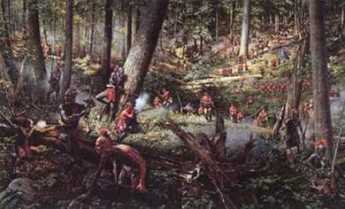
|
| French & Indian War |
Following the French and Indian War, the colonies experienced a major commodity depression which seems to have been caused by wartime shortages followed by post-war surpluses (associated with failure to adjust to the resulting financial confusion). In Milton Friedman's theory, it is the task of any government to maintain stable prices by balancing the amount of currency in circulation with the size of the gross national product. In 1770, the British Exchequer would thus have had to expand and contract the amount of currency in circulation pretty rapidly to maintain economic stability in the bumpy Colonial economy. Essentially, they had to ride a bucking broncho three thousand miles away. In the Eighteenth Century, there was no trace of understanding of the issues involved. Adam Smith's Wealth of Nations was only published in the fateful year of 1776, for example. Even if the techniques for maintaining stable prices had been crystal clear, there was a thirty-day lag in communication across the Ocean, and comparable lags between the colonies, where different imports and exports were affected at varying times. So it is a little harsh to blame the British for the chaotic result, except to notice that strongly centralized, the trans-Atlantic government was by nature unsuitable for managing rapidly-changing problems, currency and otherwise. The British government had more than a century of experience that should have made that clear. That's what the colonists said, in effect, and their solution for it was Independence.

|
| George III |
If you believe Friedman, a shortage of coinage causes a fall in prices or deflation. To correct that, you need a central banker constantly fine-tuning the currency. But banking in the colonies was too rudimentary to consider such a thing. If you needed a mortgage, you went to a prosperous neighbor and borrowed directly from him. That was fine because prosperous colonists had limited opportunities to invest their money conveniently, except by loaning money to their neighbors. Indeed, local communities were knit together socially by the mutual assistance of successful farmers directly assisting their less fortunate neighbors. However, pioneer farming

|
| Depression-era Farm Family |
communities are far too unsophisticated to remain tranquil when problems arise out of abstractions. Suddenly and without apparent explanation, in 1770 there was no money for anybody to use, and the fellow with a mortgage on his farm couldn't make his payments even though he was otherwise entirely successful. His creditor himself than couldn't pay his own bills, and eventually, even the kindliest ones were driven to foreclose the mortgage. It was said to be common for a farm worth $5000 to be sold to satisfy a mortgage of $100. And in this way, many honest and once-prospering farmers were forced to walk past their old home, now owned and occupied by a formerly friendly neighbor. It all seemed bitterly unfair, no one understood what was happening, evil motives were readily suspected, and old religious and personal grievances were heightened. When the British finally imposed a total ban on paper money as well as a prohibition of the export of British coinage outside the United Kingdom, things became almost impossible to manage. Almost no one knew exactly what was going on, but everyone could see it was bad. The colonies rapidly deteriorated toward class warfare, which is what the division between Tories and Rebels was soon to become, with both sides quite rightly asserting they were not responsible, and quite wrongly asserting the other must be.
From a far distance, it can be readily perceived the primitive banking and transportation systems of that time were inadequate to respond to the rapidly changing financial problems of a global empire; and it can be readily surmised that many other non-financial issues of governance were similarly hampered by attempting to centralize control over vast distances. In that sense, the colonists were approximately correct in directing their indignation to the person of King George III, whose mother was constantly nagging him to "be a real King". He had the particular misfortune to be dealing with Englishmen, deeply aware of the hidden political agenda made possible in the 13th Century by the Magna Charta and made explicit in 1307, when Edward I agreed not to collect certain taxes without the consent of the realm. Essentially, Parliament placed taxation in the hands of the people, who consistently withheld consent until the king gave them just a little more liberty. This was the reason irksome micromanagement of the distant colonies was immediately countered with the cry of "No taxation without Representation" since membership in the House of Commons was a traditional and historically effective means to the end. But it was getting late for this solution. Maritime New England now wanted to go further than that in order to dominate Western Atlantic trade. Virginia and the rest of the South wanted to go all the way to Independence in order to exploit the vast empty interior wilderness of Ohio and beyond. But the Quaker colonies in the middle felt quite sympathetic with John Dickinson's advice to remain part of the Empire and make a stand for representation in Parliament. When the Lord Howe's British fleet appeared in lower New York harbor an immediate choice had to be made, and ultimately the Quaker colonies were swayed by Benjamin Franklin's embittered report of his mistreatment in Parliament, and his assessment that he could persuade the French to help us. However reluctant they were to resort to force, the Quaker colonies had to choose, and choose immediately: either flee as Tories to Canada, or stand and fight.
Mercantilism Dies Hard

|
| Mercantilism to Americans |
Whatever mercantilism was supposed to mean can be debated by captive college students; mercantilism to Americans is and was just a bad thing having to do with economics, mentioned only when the speaker is searching for an epithet. Our present understanding of the mercantilist term is that brutal government action, even war, was employed to benefit favored citizen merchants, while the economics of a whole nation of consumers was subverted toward enhancing state power. All of this rapacity was for the betterment of one nation at the expense of its neighbors, and at the expense of its colonies. The surprisingly vague but more modern term of fascism is often substituted, to denote evil uses of government to promote the interest of combined military and industrial elite, to the general disadvantage of everyone else. Because so many opponents of mercantilism were upset about specific forms of mercantilist activity, Adam Smith is associated with the idea that mercantilism was the opposite of international free trade, and the American founding father are associated with the idea that mercantilism embodied everything we disliked about colonialism. Some prominent 18th Century leaders constructed a body of theory to defend mercantilism and firmly established the idea that the whole approach was founded on long-discredited sophistry. In recent times, the only reputable economist to defend parts of mercantilism was John Maynard Keynes, who approved of the idea of emphasizing third-world exports in order to assist developing countries into a modern economy. Whatever is the underlying idea behind this mercantilist idea that has caused so much trouble, and includes so many disconnected features?
Allow an amateur theory. In my view the fundamental misconception underlying mercantilism was the idea that economic relations between individuals and nations are a zero-sum game; what I gain must be at the expense of someone else's loss. Almost every child believes that many or even most everyday transactions seem to confirm it, and vast multitudes of mankind believe it to the end of their days. But as part of the Industrial Revolution, the counter-intuitive realization began to spread that cooperative behavior, within limits, could sometimes result in all participants becoming better off, harming no one. Perhaps it was even a universal idea. Adam Smith popularized the idea that when two parties freely participate in the free trade of a marketplace, each one can come away from the trade feeling better off; one party would rather have the goods, the other party would rather have the money, and they trade. Multiplied millions of times, the expansion of free trade would enrich whole nations, even the whole world. George Washington may not have understood all that, but he did know that England was injuring him with rules about insisting British subjects must conduct all foreign trade in British sailing vessels, must not manufacture locally, must do this, must not do that.
Exporting was good, importing was bad, manufacturing was to be concentrated in the mother country, consuming was to be discouraged -- what was the unifying theory behind all this? It would seem to have been the gold standard. Gold was durable, and its supply was limited. It had certain undeniable advantages, but its overall effect was to restrain industrial progress. If the economy is constantly expanding, but the supply of gold is relatively limited, the price or value of everything will go steadily down over time. In George Washington's time that was particularly irksome with regard to the value of his plantation, and his vast land holdings of Ohio land. It was also true of everything else that was reasonably durable. If everything is measured in gold, and gold is limited, then the accumulation of gold is ultimately the only way to accumulate wealth. The English nobility who were profiting from the system might not perceive it, but the colonists could perceive it in their bones. Small wonder that modern banking, economics and innovative finance took root in the American colonies. If not first, at least most vigorously. Small wonder we had a revolution men would die for, while the British were merely annoyed and mystified.
Vast areas of Asia, Africa and the Middle East are still committed to the idea that the only way to get rich is to steal from others; since everyone wants to get rich, everyone steals. Someone has reduced this idea to a simple game theory called the Prisoner's Choice. If two prisoners tattle on each other, both will be severely punished. If both prisoners refuse to testify, both will go free. If one tattles and the other remains mum, the tattler will go free and the loyal comrade will get hanged. Reduced to its simplest level in a series of repeated games, the theory states that it's better for everybody to cooperate most of the time, but you must be willing to play tit for tat if the other party cheats. Be cooperative as much as you can, but never forget to wallop a cheater, and then forgive him later so he can have a chance to play nice. Lots of people will think you are a sucker if you play nice, so, unfortunately, it is necessary to retaliate -- swiftly and painfully -- when someone cheats. Centuries of American history are explainable with this simple game theory.
And not just with tribesmen and Nazis. When Winston Churchill finally realized that the Bretton Woods Conference was going to mean the end of the British Empire, he was almost tearfully plaintive with his friend Frank Roosevelt, but he said he understood.
And six years later, when Churchill's protege Anthony Eden invaded Egypt over the Suez Canal, Dwight Eisenhower the hero of the Normandy Invasion that saved England, suddenly turned nasty. England would immediately abandon that invasion, or Eisenhower would foreclose on British debts and ruin them.
That was the end of British colonialism, and in a sense, it was the final end of the Revolutionary War.
Quakerism and the Industrial Revolution
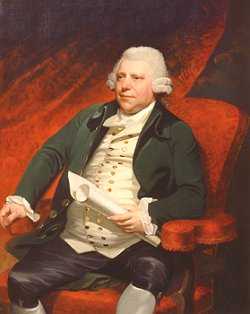
|
| Richard Arkwright |
The Industrial Revolution had a lot to do with manufacturing cotton cloth by religious dissenters in the neighborhood of Manchester, England in the Eighteenth Century. What needs more emphasis is the remarkable fact that Quakerism and the Industrial Revolution both originated about the same time, in about the same place. True, the industrializing transformation can be seen in England as early as 1650 and as late as 1880. The Industrial Revolution thus extended before Quakerism was even founded, as well as long after most Quakers had migrated to America. No Quaker names are much mentioned except perhaps for Barclay and Lloyd in banking and insurance, and Cadbury in candy. As far as local history in England's industrial midlands is concerned, the name mentioned most is Richard Arkwright, whose behavior, demeanor and beliefs were anything but Quaker.
He seems to have invented nothing, stealing the patents and ideas of others freely, while disgustingly boasting about his rise from rags to riches. Some would say his skill was in the organization, others would say he imposed an industrial dictatorship on a reluctant agricultural community. He grew rich by coercing orphans, convicts and others he obviously disdained into long, unpleasant, boring and unwelcome labor that largely benefited him, not them. In the course of his strivings, he probably forced Communism to be invented. It is no accident that Karl Marx wrote the Communist Manifesto while in Manchester visiting his friend Friedrich Engels, representing reasonably well the probable attitudes of Arkwright's employees. What Arkwright recognized and focused on was that enormous profits could flow from bringing piecework weaving into factories where machines could do most of the work. Until his time, clothing was mostly made by piecework at home, with middlemen bringing it all together. The trick was to make clothing cheaper by making a lot of it, and making a bigger profit from a lot of small profits. Since the main problem was that peasants intensely disliked indoor confinement around dangerous machines, the industrial revolution in the eyes of Arkwright and his ilk translated into devising ways to tame such semi-wild animals into submission. For their own good.
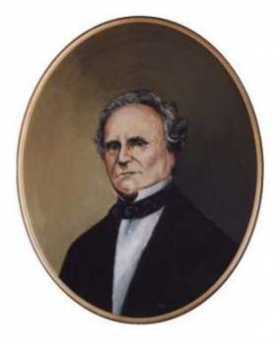
|
| Charles Babbage |
Distinctive among the numerous religious dissenters in the region, the Quakers taught that it was an enjoyable experience to sit indoors in quiet contemplation. Their children were taught to submit to it at an early age, and their elders frequently exclaimed that it was a blessing when everyone remained quiet, enjoying the silence. Out of the multitude of religious dissenters in the first half of the Seventeenth century, three main groups eventually emerged, the Quakers, the Presbyterians, and the Baptists. Only the Quakers taught that silence was productive and enjoyable; the Calvinist sects leaned toward the idea that sitting on hard English oak was good for the soul, training, and discipline was what kept 'em in line.
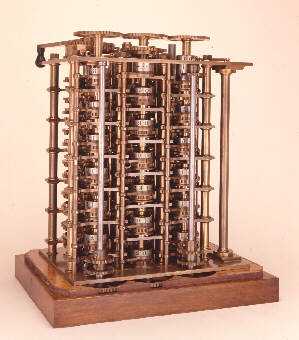
|
| babbagemaq.jpg |
The Quaker idea of fun through daydreaming was peculiarly suitable for the other important feature of the Industrial Revolution that Arkwright and his type were too money-centered to perceive. If workers in a factory were accustomed to sit for hours, thinking about their situation, someone among them was bound to imagine some small improvement to make life more bearable. If such a person was encouraged by example to stand up and announce his insight, eventually the better insights would be adopted for the benefit of all. Two centuries later, the Japanese would call this process one of continuous quality improvement from within the Virtuous Circle. In other cultures, academics now win professional esteem by discovering "win-win behavior", which displaces the zero-sum or win/lose route to success. The novel insight here was that it has become demonstrably possible to prosper without diminishing the prosperity of others. In addition, it was particularly fortunate that many Quaker inhabitants of the Manchester region happened to be watchmakers, or artisans of similar trades that easily evolved into the central facilitators of the new revolution -- becoming inventors, machine makers and engineers.
The power of this whole process was relentless, far from limited to cotton weaving. When Charles Babbage sufficiently contemplated the punched-cards carrying the simple instructions of the knitting machines, he made an intellectual leap to the underlying concept of the tabulating machine. Using what was later called IBM cards, he had the forerunner of the stored-program computer. There were plenty of Arkwrights getting rich in the meantime, and plenty of Marxists stirring up rebellion with the slogan that behind every great fortune is a great crime. But the quiet folk were steadily pushing ahead, relentlessly refining the industrial process through a belief in welcoming the suggestions of everyone.
Pennsylvania: Browbeaten Into Joining a War
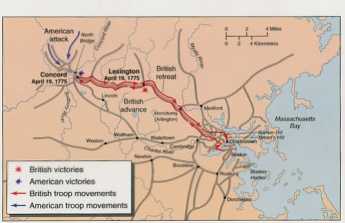
|
| Battle of Lexington |
In April 1775, the colonial militia were shooting it out with British soldiers at Bunker Hill and Lexington/Concord. If you include December 16, 1773, Boston Tea Party, Massachusetts had been fighting the British for almost three years before July 4, 1776. It had never been absolutely clear to Pennsylvanians just what they were fighting about in New England, beyond the fact that a considerable store of gunpowder was hidden in Lexington and Concord and British soldiers had been sent to confiscate it, along with those two trouble-makers, Samuel Adams and John Hancock. The militiamen behind the trees were just as British as the soldiers were, and their short slogan of fair treatment was to elect representatives to any Parliament which claimed a right to tax them. Snubbed by a high-handed King, they got his attention by shooting back when the King tried to enforce laws they had not had a chance to vote on. Seeing your neighbors shot soon clarifies your options. Other colonies, especially Pennsylvania, Delaware and South Carolina, were slower to anger about either taxation or representation, worrying more about the motives of unstable leaders in Massachusetts like Samuel Adams, and content to stall while British Whigs led by Edmund Burke and the Marquess of Rockingham tried to civilize the king's ministry. Besides, the British were not attacking Pennsylvania.
To be fair to the hot-headed New Englanders who were apparently stirring up so much unprovoked trouble, a better case could have been made against the heedless British ministry, and New England lawyers should have made it. Following the Boston Massacre, there was genuine alarm among lawyers like John Adams that King George was eroding historic legal rights achieved over several centuries, indeed, preferentially undermining them more for mere colonists than for U.K. citizens with a vote. The Navigation Acts of the British government, in particular, were offensive to American colonists; randomly chosen representatives on juries proceded to render them unenforceable with a wide-spread refusal to convict. They were employing William Penn's strategy of "Jury Nullification", and better acknowledgment of its legal history was sure to make a favorable impact on Philadelphia minds. Somehow, the Boston legal community felt this line of argument was too specialized to be effective, or else shared the alarm of their enemy the British Ministry that Jury Nullification in the hands of the public could be too hard to control. John Adams had made a particularly famous defense of John Hancock who was being punished with confiscation of his ship and a fine of triple the cargo's value. Adams was later singled out as the only named American rebel the British refused to exempt from hanging if they caught him. As everyone knows, Hancock was the first to step up and sign the Declaration of Independence, because by 1776 there was also widespread colonial outrage over the British strategy of transferring cases to the (non-jury) Admiralty Court. Many colonists who privately regarded Hancock as a smuggler were roused to rebellion by the British government thus denying a defendant his right to a jury trial, especially by a jury almost certain not to convict him. To taxation without representation was added the obscenity of enforcement without due process. John Jay, the first Chief Justice of the Supreme Court of the newly created United States, ruled in 1794 that "The Jury has the right to determine the law as well as the facts." And Thomas Jefferson built a whole political party on the right of common people to overturn their government, somewhat softening it is true when he saw where the French Revolution was going. Jury Nullification then lay fairly dormant for fifty years. But since the founding of the Republic and the reputation of many of the most prominent founders was based on it, there may have seemed little need for emphasis of an argument any modern politician would seize with glee.
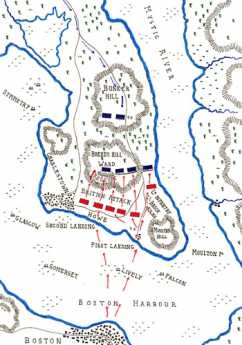
|
| Bunker Hill |
At that time, only a third of colonists were in favor of fighting about it, and a third was entirely opposed. Samuel Adams himself had written his supporters that it would be best to hold back until greater revolutionary support could be gathered. Unfortunately, in the minds of the British ministry, hostility had already escalated irrevocably when the Continental Congress in June 1775 created the Continental Army and dispatched George Washington to Boston to join the fight. This was probably the moment when war became inevitable in the collective mind of the British Parliament; a full year had passed since then. Regardless of Bunker Hill, the British were incensed by the creation of the Continental Army, and passed the Prohibitory Act, which declared that all thirteen colonies (belonging to the Congress) were renegades, their decision to raise armies placing them "outside the protection of the king". All American shipping was now subject to seizure, not just that of Massachusetts, as were foreign vessels engaged in American trade. News of this Parliamentary thunderbolt first came to Robert Morris through one of his ships, accompanied by news that 26,000 troops had been raised for an invasion of American ports. The British position was that all thirteen colonies had gratuitously formed a government and an army, and needed to be punished for such treason. Pennsylvania was no exception; the offending Continental Congress had met there, and Benjamin Franklin had represented both Massachusetts and Pennsylvania before Parliament. Confirmation of that particular British attitude toward them greeted Pennsylvanians when British warships promptly appeared in May 1776, to patrol the mouth of Delaware. Three cruisers exploring up the river were attacked by American galleys. In response, the cruisers sailed directly at Philadelphia until they were finally beaten back by citizen flotillas, supervised by Robert Morris and the Committee on Safety. Morris wrote to Silas Deane in Paris that war was probably inevitable. Far less tentatively, the British felt it had already been in progress for a year.
The British Ministry had probably been unreasonably hostile, but they were not unanimous and they were not fools. In response to colonial unrest up until these almost irretrievable events, the British were concentrating on depriving the colonists of arms and gunpowder, mostly avoiding direct violence; it seemed an effective strategy. During the Boston Tea Party, for example, British warships in Boston harbor merely stood by and watched the fun. Although gunpowder was a simple chemical, comparatively easy to make, it was less likely to blow up in your face if finely ground and milled in a major factory; for a real Colonial war it had to be imported. The British strategy had been: Take away their weapons, and they will capitulate. Unfortunately, that was not the response at all, since even loyal colonists felt they needed good gunpowder for hunting and self-protection. Gunpowder blockades and confiscations were going to be bitterly resented. Nevertheless, British patience with the colonists was probably only irretrievably exhausted in June 1775, when the Continental Congress formed its own army and Washington marched them to Boston. If Pennsylvania became convinced of that inevitability, the war was certainly on. After the naval battles right here on Delaware, what really became hard to believe was that -- only a week earlier -- Pennsylvania's moderate voters had soundly defeated the revolutionary radicals in an Assembly election.
Pennsylvania had indeed been far less eager to fight than Massachusetts and Virginia, but the more belligerent colonies felt they needed allies in order to prevail. In the Continental Congress Pennsylvania and South Carolina voted against rebellion in the Spring of 1776; and in the May 1776 election where independence was the main issue, the Pennsylvania voters elected an Assembly 70% opposed to rebellion, including that eminent merchant Robert Morris. Some of the determined Massachusetts efforts to persuade the Mid-Atlantic colonies bordered on subversion, but Pennsylvania remained unmoved. Nevertheless, they could see a real danger of war and had approved Secret Committees to be prepared if it came. Robert Morris was ideal for covert activity and could be expected to keep the activity under control, along with Benjamin Franklin and several prominent merchants. Morris made no secret of his affection for England the country of his birth, or of his membership in the John Dickinson group which hoped economic pressures would suffice. When the Secret Committee chairman suddenly died of smallpox, Morris was then appointed a chairman. His personal integrity was widely respected; in several hotly contested elections, he was nominated by both the radicals and the conservatives.
 It seems absolutely necessary to prepare a vigorous defense since every account we receive from England threatens nothing but destruction. 
|
| Robert Morris: December 1775. |
The Secret Committee was charged with smuggling in some gunpowder, just in case. Several of the members agreed to ship arms and gunpowder in their own ships; there was no one else to do it. The decision to engage in treasonous gunrunning was greatly assisted by the unexpected appearance of two Frenchmen with aristocratic accents in a boat loaded with gunpowder, who proposed themselves as French counterparties in a major gunpowder and weapons smuggling network which did actually materialize. Just who sent them has never been made entirely clear, but later events make the playwright Beaumarchais a reasonable guess, acting as a secret agent of the French King. Beaumarchais the famous playwright had been caught in a police trap, and forced to act as a government spy; just whose agent he was is a little murky. The American merchants on the Secret Committee knew gun running was expensive for them; they all expected to be paid for dangerous work, so it was also profitable. And treasonous. If caught, there was every possibility of being hanged. Initially, the Americans all imagined the Frenchmen were simply in it for the money, and that is possible. Surprisingly, no one seems even to have speculated they were agents of the French government on a mission to stir up trouble against the English. Spies had surely informed the French King of approaching war, at least six months before the Americans knew of it. Since these two foreign shippers (giving their names as Pierre Penet and Emmanuel de Pliarne, and surely sent to spy) demanded to be paid in hard currency, Morris did send one ship with hard money to pay for munitions to be carried in its hold on the return voyage. But he soon devised safer payment approaches.
 For my part I abhor the name & the idea of a rebel, I neither want or wish a change of King or Constitution & do not conceive myself to act against either when I join America in defense of Constitutional Liberty. 
|
| Robert Morris: December 1775 |
Since he had agents and offices in most major foreign ports, Morris could arrange for the money to arrive independently of the cargo ships. Or better yet, send ordinary commodities on the outward journey and make a private profit on that, returning with munitions paid for by the "remittances" -- revenue from the other cargo. Money was also sent on other circuitous journeys and through other channels, particularly the discounted debt system he had earlier perfected when the paper currency had been prohibited. There was thus less incriminating evidence on the ship, and even if the ship burned or everyone got hanged, the money was at least out of the hands of the enemy. Secrecy was, of course, essential, this activity could be called treasonous, and it was most assuredly smuggling. When neutral countries were found supporting gunrunning, that assistance might well be called an act of war, so all nations prohibited it. In spite of his earlier reluctance about independence, Morris could easily see that gunrunning by the privateers of a recognized nation might be better protected by the conventions of war than exactly the same activity conducted by, say, brigands, profiteers or pirates.
Gunrunning was always seriously dangerous; Morris soon lost four ships, one by a mutiny of secretly loyalist sailors, and two were captured by unscrupulous American privateers. There would be some protection from hanging for gun runners as authorized combatants of a recognized nation. In retrospect, we can now surmise that Franklin was committed to independence, and was probably nudging his friend on the Secret Committee. John Adams could barely contain himself, openly and repeatedly. Washington was already outside Boston leading an army. The commitment had many levels.
In July 1776 Morris was called on to vote in Congress for the independence he always said he opposed. Caesar Rodney rode in from Delaware to deliver his state for Independence; now, Pennsylvania alone stood in the way. When the moment came, on the advice of Franklin, Robert Morris, and John Dickinson left the room to allow other Pennsylvania delegates to constitute a Pennsylvania majority, casting the state's vote for the war. Commitment to the war had many variants, even after the war began.
Reconsidering All Our Laws
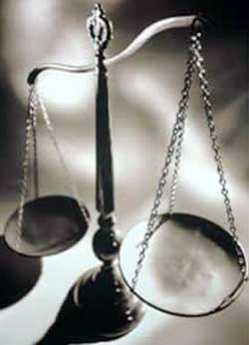
|
| Common Law |
A KING who conquers a new country theoretically gains the chance to revise all its laws. However, thousands of years of experience demonstrate that those who are good at wielding the sword seldom have much interest in, or aptitude for, devising a legal code. Napoleon seems to have been an exception, and Alexander the Great was tutored by Aristotle, but most conquerers have been illiterate in the law. Therefore, earlier conquerors merely extended their native laws into additional territory or else left the whole business to a permanent priesthood of judges. In this way, an independent judiciary could survive unless, like Thomas a Becket or Thomas More, it grew stubborn about thwarting the wishes of the King. The concept of citizen rights more or less defined feasible limits to what the King was allowed to do. British law went still further, distinguishing between rights of the people and rights of the sovereign. It identified those few things even a King was not allowed to do, as well as those many things he alone must be able to do in order to govern. The latter were collectively called the King's Prerogative. Today, we would call it a job description.
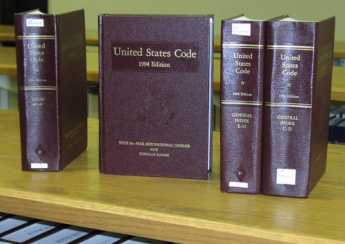
|
| U.S. Codes |
Along those lines, the English Civil War had been fought, briefly transferring the power of Prerogative to Parliament, and incidentally clarifying some disadvantages of doing so. Americans, after fighting an eight-year Revolutionary War to be rid of a particular king, had developed a sentiment for eliminating all kings entirely. However, the memory of the English Civil War and subsequent abuses by the Cromwell Parliament restrained that impulse. The alternative idea grew of transferring sovereignty to the people, to be translated into action by their elected representatives in the Legislative branch. Although such sovereignty would be unlimited, the intermediate steps taken by the Legislature could be deliberately slowed down, and particularly worrisome actions might be tangled up in complicated steps of legal process by a vocal minority. Such a complicated system required an umpire, which Chief Justice John Marshall eventually positioned the Supreme Court to be. Conducting elections every two years was a simple way to allow the people to restrain its agents from the misbehavior of a more general sort. Since George Washington was confidently expected to be the first President, it was left to him to devise protections against presidential abuse, since he had notoriously and repeatedly expressed his intense dislike of kings. In modern times this system of checks and balances has only been severely tested once, in 1937. Immediately after winning a landslide re-election in 1936, Franklin Roosevelt nevertheless was slapped down hard by public outcry forcing Congress to thwart his Supreme Court-packing scheme.
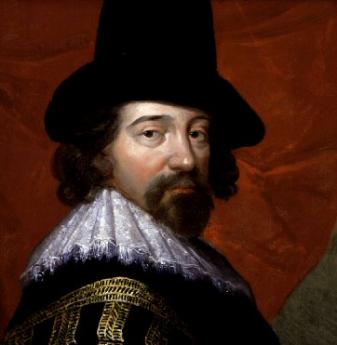
|
| Sir Francis Bacon |
Such subtle, complicated ideas cannot be implemented by writing 6000 words on a piece of paper, and they certainly cannot withstand two hundred fifty years of subsequent nit-picking by dissenters, no matter how carefully crafted the 6000 words may have been. The complexity of the political system it describes would long ago have fallen apart without a million little accommodations and revisions, just as every other nation's constitution has done during that same period of time. And that fine-tuning process was made possible by starting with a more or less blank slate, with thousands of lawyers and legislators debating every particle of common law for more than a century. In 1787 it was decided to adopt English common law as a default position, and to invite a host of legislative bodies to debate and replace any part of it with a "statute". It was a laborious process. Measured by pages of law books, the volume of statutes only grew to equal the volume of common law by the time of the Civil War. The English common law was certainly a good place to start, having been created by Sir Francis Bacon two hundred years earlier as the legal equivalent of the Scientific Method; based on real, adversarial contested case decisions, a hypothesis was created, then tested, revised, and tested again. By actual count, one state legislature only enacted three statutes in the year before the Constitution was ratified; all its other activity was concerned with adjudicating disputes within the boundaries of the existing common law. But when the Constitution suddenly rearranged the balances of power in 1787, almost every sentence of common law had to be regarded as potentially requiring modification to reflect the new Constitutional rearrangements. During the first half century there existed great enthusiasm for almost all of the new Constitution except those parts which affected slavery, the fine-tuning was almost universally intended to strengthen it or repair some oversight. If it failed in some way, adversaries were quick to point out the flaws. In short, every lawyer in the nation was involved to some degree for a century in the process of re-writing the English common law for American purposes, in American circumstances, for the grander purpose of strengthening the American commonwealth.
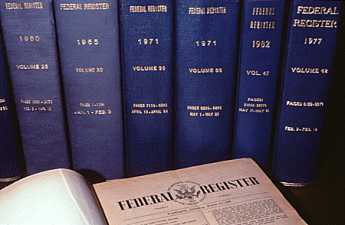
|
| Federal Registry |
And everyone knows what happened next. The state legislatures who considered it normal to pass fewer than a dozen laws in a year started passing fifteen hundred in a year and kept it up for many years. Today, almost every state legislature considers more than a thousand bills and passes two or three hundred. Since the colonial legislatures passed few laws and spent most of its time adjudicating disputes about existing law, the character of the law changed as it gradually gave up adjudicating, stopped being like a court. The tendency of early law was to state principles to guide the judges. In recent times, our over-lawyered system specifies all imaginable conditions and exceptions in excruciating detail, so that our laws tend less and less to speak of "reasonable amounts" and more and more to define drunken driving, for example, in milligrams per deciliter of the defendant's blood. We have better measuring devices, so we measure. But who can deny that a legislature accustomed to making judgments itself, will more confidently rely upon the good judgment of courts, than a legislature which spends its time going to committee meetings to consider the testimony of experts, often never visiting a courtroom?
Our lawyers, who once enlisted the efforts of the entire profession for a century into refining the English common law into the American statutory law, are to be encouraged to extend equal effort into the process of turning off the faucet. Or possibly, having done such a good job at this assignment, seek another line of work?
The Origin of States Rights, a Rumination
ALMOST alone among the British colonies in America, Pennsylvania's western border was specified in the King's charter of the colony. It was "five degrees longitude west of the point where the eastern boundary crosses the Delaware" [River]; however, its actual location on the ground was not actually marked until 1784. It's a few miles west of the present city of Pittsburgh, located at the forks of the Ohio River, where the Allegheny and Monongahela Rivers join. However, until 1784 it was not a certainty that this complex was within Pennsylvania instead of Virginia. The origin of Ohio is at the only major water gap in the North-South mountains, and the tributary rivers are fairly large. The three merging rivers thus form a nearly continuous water route along the base of the mountain range, from the Great Lakes south to Pittsburgh, or from the Chesapeake Bay north to Pittsburgh, and then to the Mississippi, going past the best topsoil farming land in the world. The forks of Ohio were the great prize of the Seventeenth and Eighteenth centuries, the place where young George Washington himself started the French and Indian War. To include these treasures, it seems vaguely possible that William Penn insisted on having the border of his state safely include the water gap at the beginning of Ohio. Perhaps not, of course, perhaps it was just a sense of tidiness on the part of the ministers of Charles II. The original document stated that the border was a hundred miles east of there, to match where Maryland ended. When the document was returned to Penn by the King's ministers, however, it had the new language.
The existence of this north-south termination of Pennsylvania began to take on a new significance when other states made claims for their land grant to extend to the Pacific Ocean, and the extensions collided with each other. Virginia then developed its territory to include modern Kentucky and West Virginia. That resulted in Virginia's land aspirations veering northward, to include the Ohio Territory west of Pennsylvania's fixed boundary. By the legal standards of the day, Virginia had a fairly good claim to all of the Indian territories, not merely to the west of Pennsylvania, but extending at least to the Great Lakes, perhaps farther. Maryland, Connecticut, New York, and Massachusetts had conflicting claims from an infinite extension of their western boundaries. As a consequence, it was impossible to achieve ratification of the Articles of Confederation for five years. The various states involved were fearful of the creation of a combined political entity might result in a court which would be enabled to rule against their individual aspirations. The stakes were high; the land mass involved would be several times as large as England.
The person who finally broke this deadlock might well have been Robert Morris, who was disturbed that this inter-state dissension was injuring his ability to borrow foreign funds for the Revolutionary War. The internal negotiations took place under wartime conditions, and are poorly researched. No doubt some person deserves credit for bringing this wrangle to a close. Virginia had the strongest claim, New York the weakest. New York gave up its claim first, Maryland was the last, and Virginia the most disappointed. Pennsylvania, unable to make a claim, took the position that the land belonged to everyone, and eventually was mollified by getting a small notch of land extending to the Great Lakes at Erie. It must be noticed in passing that final resolution of the land claims came at the Treaty of Paris ending the Revolution. Benjamin Franklin, soon to become President of Pennsylvania, was the negotiator of the treaty which reflected Pennsylvania's position that the land belonged to all of us, right?
Even without these western land claims, Virginia was the largest and richest of the colonies, and rather easily adopted the attitude that Virginia would be the leader of the new United States. From their viewpoint, the preservation of states rights would enhance Virginia's leading the country. More or less immediately, the attitude of small states like Delaware hardened into resistance that this must not happen. Much otherwise inexplicable behavior also begins to make a sort of sense: the perverse behavior of the Lee family in the Continental Congress, the quarrels within George Washington's cabinet, the relocation of the capital and the dreams of the Potomac as the nation's main portal of transportation, the rise of Jefferson's political party, the obstructionist behavior of Patrick Henry, the Virginia domination of the Presidency for decades, and countless less famous episodes of history -- make more sense as residuals of Virginia's early land aspirations, than as defenses of slavery or philosophical convictions that states were somehow superior to nations. These suspicions are difficult to clarify and impossible to prove. The best way to see some substance to them is to imagine yourself in the Virginia House of Burgesses, politically connected and vigorous, able to imagine your descendants all inheriting a county or two of rich land as a remote consequence of a few glamorous deeds by their Cavalier ancestor.
The Personalities
John Head, His Book of Account, 1718-1753
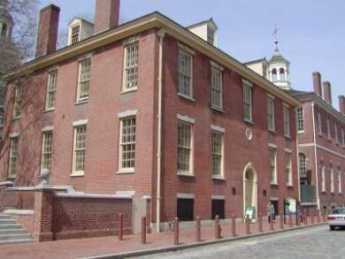
|
| American Philosophical Society |
Jay Robert Stiefel of of the Friends Advisory Board to the Library of the American Philosophical Society entertained the Right Angle Club at lunch recently, and among other things managed a brilliant demonstration of what real scholarship can accomplish. It's hard to imagine why the Vaux family, who lived on the grounds of what is now the Chestnut Hill Hospital and occasionally rode in Bentleys to the local train station, would keep a book of receipts of their cabinet maker ancestor for nearly three hundred years. But they did, and it's even harder to see why Jay Stiefel would devote long hours to puzzling over the receipts and payments for cabinets and clock cases of a 1720 joiner. Somehow he recognized that the shop activities of a wilderness village of 5000 residents encoded an important story of the Industrial Revolution, the economic difficulties of colonies, and the foundations of modern commerce. Just as the Rosetta stone told a story for thousands of years that no one troubled to read, John Head's account book told another one that sat unnoticed on that library shelf for six generations.
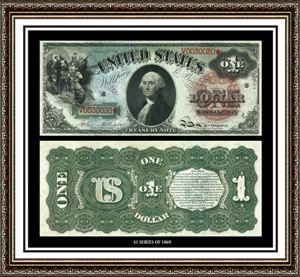
|
| Colonial Money |
The first story is an obvious one. Money in colonial days was mainly an entry in everybody's account book; today it is mainly an entry in computers. In the intervening three centuries, coins and currency made an appearance, flourished for a while as the tangible symbol of money, and then declined. Although Great Britain did not totally prohibit paper money in the colonies until 1775, in John Head's day, from 1718 to 1754, paper money was scarce and coins hard to come by. Because it was so easy to counterfeit paper money on the crude printing presses of the day, paper money was always questionable. Meanwhile, the balance of trade was so heavily in the direction of the colonies that the balance of payments was toward England. What few coins there were, quickly disappeared back to England, while local colonial commerce nearly strangled. The Quakers of Philadelphia all maintained careful books of account, and when it seemed a transaction was completed, the individual account books of buyer and seller were "squared". The credit default swap "crisis" of 2008 could be said to be a sharp reminder that we have returned to bookkeeping entries, but have badly neglected the Quaker process of squaring accounts. As the general public slowly acquires computer power of its own, it is slowly recognizing how far the banks, telephone companies, and department stores have wandered from routine mutual account reconciliation.
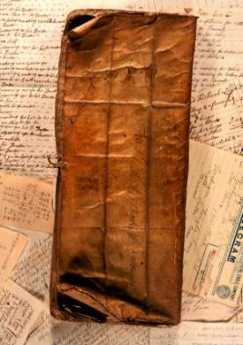
|
| John Head's Account Book |
From John Head's careful notations we learn it was routine for payment to be stretched out for months, but no interest was charged for late payment and no discounts were offered for ready money. It would be another century before it became routinely apparent that interest was the rent charged for money and the risk of intervening inflation, before final payment. In this way, artisans learned to be bankers.
And artisans learned to be merchants, too. In the little village of Philadelphia, chairs became part of the monetary system. In bartering cabinets for the money, John Head did not make chairs in his shop at 3rd and Mulberry (Arch Street) but would take them in partial payment for a cabinet, and then sell the chairs for the money. Many artisans made single components but nearly everyone was forced into bartering general furniture. Nobody was paid a salary. Indentured servants, apprenticeships trading labor for training, and even slavery benignly conducted, can be partially seen as efforts to construct an industrial society without payrolls. Everybody was in daily commerce with everybody else. Out of this constant trading came the efficiency step for which Quakers are famous: one price, no haggling.
One other thing jumps out at the modern reader from this book of account. No taxes. When taxes came, we had a revolution.
www.Philadelphia-Reflections.com/blog/1517.htm
Tom Paine: Rabble-Rousing Quaker?
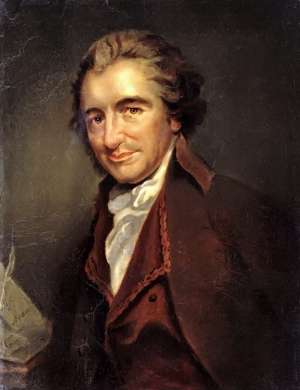
|
| Thomas Paine |
Thomas Paine (1737-1809) was born of Quaker parents, which makes him a "birthright" Quaker. Children born into Quaker families are accustomed to the subtleties of speech and behavior of that religious sect, ultimately growing up to be the main nucleus of tradition. Knowing what they are getting into, however, they are more likely to rebel against it than others who, coming to the religion by choice rather than by birthright, are commonly described as "Convinced Friends."
These stereotypes may or may not explain some of Tom Paine's paradoxes. He certainly was not a pacifist, a quietest, or a plain person. He was an important historical figure; Walter A. McDougall, the famous University of Pennsylvania historian, feels the American colonists might have sputtered and complained about Royal rule for decades, except for Paine. The American Revolution happened when it happened because Tom Paine stirred up a storm.
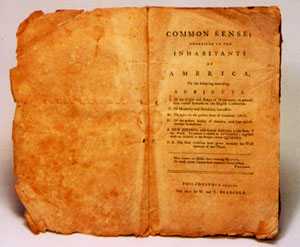 |
| Common Sense |
According to the traditional way of telling his story, Tom Paine was a ne'er do well failure in London. He ran into Benjamin Franklin, who advised him to emigrate to America in 1775, and within a year his pamphlet called ""Common Sense"" had sold 150,000 copies (some even claim 500,000), galvanizing the public and the Continental Congress into action on July 4, 1776. George Washington read Paine's writings to his troops on the eve of the Battle of Trenton. After that, Paine got mixed up with the French Revolution, and apparently became a severe alcoholic, proclaiming atheism all the way. Although Thomas Jefferson remained friendly to the end, Benjamin Franklin essentially told him to go leave him alone, and Washington would cross the street to avoid him. According to the usual line, Tom Paine was a big-mouthed rabble-rouser and a drunk, who traveled the world looking to stir up revolutions.
However, that cannot possibly be a fair recounting of the whole story. Thomas Alva Edison, whose opinion certainly counts for something, regarded Tom Paine as one of the greatest American inventors, creating the first steel bridge, the first hollow candle, and the principle of central drought in heating. Paine early became a close friend of the Hicks family, the central figures in modern Quakerism; it seems a little unclear how much Tom Paine was reflecting the views of Elias Hicks, and how much Hick site Quakerism can be said to have originated in the thinking of Thomas Paine. Paine was very far from being an atheist. In fact, both he and Hicks believed so fervently in the universality of God that both of them scorned the rituals, paraphernalia, and transparent superstitions of -- religion.
Furthermore, Paine was able to reach the rationalists of The Enlightenment with arguments which cut to the heart of Royalist loyalties. America was too big and too remote to be ruled by a king, particularly one who abused his privileges behind a claim of divine right. William the Conqueror, for example, never denied he was a usurper. One way or another, every king must earn his throne. So, as for feudalism and hereditary aristocracy, what was King George doing with all those German mercenaries? After two centuries of democracy, most Americans are too far from feudalism to appreciate the legitimacy of military meritocracy. Whatever King George was up to, he didn't stand for empowerment of the best and the brightest Englishmen, who in fact might well be opposed to him. If you wanted to get to Virginia aristocrats, Boston sea captains, and Kentucky backwoodsmen, that was exactly the line to take in Common Sense.
Unfortunately, Citizen Tom Paine was a freethinker and couldn't be quiet about it in his later books. He didn't like the way the Old Testament Hebrews hungered for a king. He didn't like the way the New Testament sprinkled miracles on top of unassailable moral principles, and he particularly didn't like the claim that God got an unmarried girl pregnant. He antagonized almost every established religion by proclaiming that no one should make a living from religion. He wrote a book called Age of Reason proclaiming all these freethinking ideas, which struck Ben Franklin as such a stupid thing to do that he would not discuss it, beyond saying that even if he should succeed in convincing people to abandon religion, just imagine how much worse they would probably behave without it. George Washington, who hadn't a trace of intellectualism about him, more accurately portrayed the typical American revulsion at anyone who was so unprincipled as to say such unorthodox things in public. Jefferson distanced himself for political reasons rather than intellectual ones. Franklin thought Paine was a fool. Washington and the rest of the country thought he was a viper.
It would have to be conceded -- by anyone -- that Tom Paine was self-destructive, even sassing Robespierre while in a French prison. How is it such a loose cannon could get the American public off dead center and make the Continental Congress grasp the nettle of revolution, in less than a year? Let's go back to how he came to America in the first place. Franklin sent him.
Then he promptly got a job as editor of the Pennsylvania Gazette, which Franklin had owned for thirty years. And then, in an era when the largest city in America had a population of twenty-five thousand, and the printing presses of the day were able to turn out three or four pages a minute, he sold 150,000 copies of the fifty-page "Common Sense." Who but Franklin, in private partnerships with sixty printers, could have possibly authorized, financed, and printed 150,000 copies of a colonial pamphlet? In order to find that much printing capacity in colonial America, a great deal of other printing had to lose its place in the queue.
Even today, a best-seller is defined as a book that sells 50,000 copies, and it generally takes three years to get it done. In the Eighteenth Century, for an unknown alcoholic to get off the boat and find a publisher for a best seller in a few weeks is hard even to imagine. Unless he had important help.
Caesar Rodney Rides Through the Rain
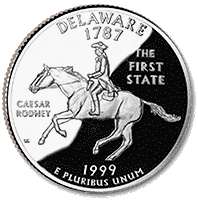
|
| Caesar Rodney |
If you have a quarter minted in 1999, you can see a depiction of Caesar Rodney riding through the rain, mud and heat, all night, to cast his July 2 vote for independence at the 1776 Continental Congress. There are no known painted portraits of Rodney, probably because his face was badly mutilated by cancer which ultimately killed him.
On July 1, Thomas McKean and George Read had split Delaware's votes in a tie, and McKean had urgently sent word to Rodney, the absent third vote, that he must come to Philadelphia quickly. Rodney was suffering from cancer. It may thus have been Thomas McKean's idea to invoke the concepts of the Treaty of Westphalia to escape hanging for armed rebellion, but Ben Franklin seems more likely. Once an idea like that gets started in a gathering, it quickly becomes everyone's idea. But Franklin was the only one to stampede a group and take no credit for doing so.

|
| Rodney |
Schoolchildren in Delaware can be forgiven for asking why Rodney wasn't in Philadelphia for the vote without being sent for. And we don't really know. Rodney certainly had plenty of other things competing for his attention, like being a Supreme Court Justice, the Speaker of the Delaware Assembly and the de facto Governor of the State, as well as being a Brigadier General in the Militia (he later was made Major General in charge of the garrison at Trenton). One has to suspect, however, that he had not expected George Read to vote against independence. Read, after all, had married the widowed sister of George Ross, who did sign the Declaration.
Asthma, a notoriously intermittent condition, may have been a worse impediment to Caesar Rodney's ride than his cancer. Although he was badly disfigured, cancer did not kill him until 1784. The prospect of riding eighty miles in the rain with asthma may well have been the reason Rodney held off until he was absolutely certain his vote was needed. The esteem and affection that Delaware holds for this farmer from Dover can be gauged by the fact that he remained the elected speaker until the day he died, and during his last three months, the legislature held its meetings in his house so he could be present.
Franklin Declares Independence a Year Early
Joseph Priestly became a close friend of Benjamin Franklin almost as soon as they met. Priestly was an Anglican clergyman who broke loose and formed the Unitarian Church, and meanwhile, his scientific discoveries also entitle him to be called the Father of Chemistry. Franklin, of course, was the discoverer of electricity; it would be hard to be sure which of the two was more brilliant. In July, 1775, Franklin wrote the following letter to Priestly, which makes a trenchant case that the American colonies should, and would, break away from England. Since some legal authorities, following Lincoln's lead, maintain that Jefferson's manifesto "informs" the United States Constitution, it might be well to begin referring to this letter as an even clearer statement of the mindset of America's founding leaders.
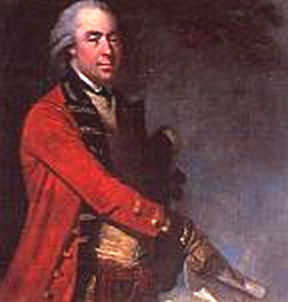
|
| General Thomas Gage |
" Dear Friend (wrote Franklin),
"The Congress met at a time when all minds were so exasperated by the perfidy of General Gage, and his attack on the country people (i.e. Of Lexington and Concord), that propositions of attempting an accommodation were not much relished; and it has been with difficulty that we have carried another humble petition to the crown, to give Britain one more chance, one opportunity more of recovering the friendship of the colonies; which however I think she has not sense enough to embrace, and so I conclude she has lost them forever.
"She has begun to burn our seaport towns; secure, I suppose, that we shall never be able to return the outrage in kind. She may doubtless destroy them all; but if she wishes to recover our commerce, are these the probable means? She must certainly be distracted; for no tradesman out of Bedlam ever thought of increasing the number of his customers by knocking them on the head; or of enabling them to pay their debts by burning their houses.
"If she wishes to have us subjects and that we should submit to her as our compound sovereign, she is now giving us such miserable specimens of her government, that we shall ever detest and avoid it, as a complication of robbery, murder, famine, fire, and pestilence.
"You will have heard before this reaches you, of the treacherous conduct to the remaining people in Boston, in detaining their goods, after stipulating to let them go out with their effects; on pretence that merchants goods were not effects; -- the defeat of a great body of his troops by the country people at Lexington; some other small advantages gained in skirmishes with their troops; and the action at Bunker's-hill, in which they were twice repulsed, and the third time gained a dear victory. Enough has happened, one would think, to convince your ministers that the Americans will fight and that this is a harder nut to crack than they imagined.
"We have not yet applied to any foreign power for assistance; nor offered our commerce for their friendship. Perhaps we never may: Yet it is natural to think of it if we are pressed.
"We have now an army on our establishment which still holds yours besieged.
"My time was never more fully employed. In the morning at 6, I am at the committee of safety, appointed by the assembly to put the province in a state of defense; which committee holds till near 9, when I am at the Congress, and that sits till after 4 in the afternoon. Both these bodies proceed with the greatest unanimity, and their meetings are well attended. It will scarce be credited in Britain that men can be as diligent with us from zeal for the public good, as with you for thousands per annum. -- Such is the difference between uncorrupted new states and corrupted old ones.
"Great frugality and great industry now become fashionable here: Gentlemen who used to entertain with two or three courses, pride themselves now in treating with simple beef and pudding. By these means, and the stoppage of our consumptive trade with Britain, we shall be better able to pay our voluntary taxes for the support of our troops. Our savings in the article of trade amount to near five million sterling per annum.
"I shall communicate your letter to Mr. Winthrop, but the camp is at Cambridge, and he has as little leisure for philosophy as myself. * * * Believe me ever, with sincere esteem, my dear friend, Yours most affectionately."
[Philadelphia, 7th July, 1775.]
REFERENCES
| The Invention of Air: A Story of Science, Faith, Revolution,and The Birth of America, Steven Johnson ISBN: 978-1-59448-852-8 | Amazon |
George Washington's View of the British Army
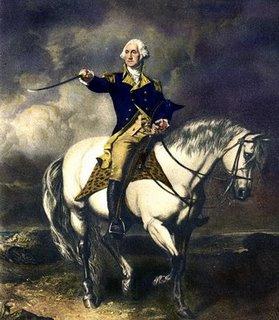
|
| George Washington |
TWO things about George Washington continue to puzzle us. Why would the rich, aristocratic Virginia gentleman become a revolutionary? And, how could he or his backwoodsmen soldiers even imagine they could defeat the British, the greatest military force in the world? The following letter, written to his mother after the defeat of Braddock's army, shows his viewpoint at the age of 23, putting the British regular army in a very bad light, indeed.
"HONORED MADAM: As I doubt not but you have heard of our defeat, and, perhaps, had it represented in a worse light, if possible, than it deserves, I have taken this earliest opportunity to give you some account of the engagement as it happened, within ten miles of the French fort, on Wednesday the 9th instant.
"We marched to that place, without any considerable loss, having only now and then a straggler picked up by the French and scouting Indians. When we came there, we were attacked by a party of French and Indians, whose number, I am persuaded, did not exceed three hundred men; while ours consisted of about one thousand three hundred well-armed troops, chiefly regular soldiers, who were struck with such a panic that they behaved with more cowardice than it is possible to conceive. The officers behaved gallantly, in order to encourage their men, for which they suffered greatly, there being near sixty killed and wounded; a large proportion of the number we had.
"The Virginia troops showed a good deal of bravery and were nearly all killed; for I believe, out of three companies that were there, scarcely thirty men are left alive. Captain Peyrouny and all his officers down to a corporal were killed. Captain Polson had nearly as hard a fate, for only one of his was left. In short, the dastardly behavior of those they call regulars exposed all others, that were inclined to do their duty, to almost certain death; and, at last, in spite of all the efforts of the officers to the contrary, they ran, as sheep pursued by dogs, and it was impossible to rally them.
"The General was wounded, of which he died three days after. Sir Peter Halket was killed in the field, where died many other brave officers. I luckily escaped without a wound, though I had four bullets through my coat, and two horses shot under me. Captains Orme and Morris, two of the aids-de-camp, were wounded early in the engagement, which rendered the duty harder upon me, as I was the only person then left to distribute the General's orders, which I was scarcely able to do, as I was not half recovered from a violent illness, that had confined me to my bed and a wagon for above ten days. I am still in a weak and feeble condition, which induces me to halt here two or three days in the hope of recovering a little strength, to enable me to proceed homewards; from whence, I fear, I shall not be able to stir till toward September; so that I shall not have the pleasure of seeing you till then, unless it be in Fairfax... I am, honored Madam, your most dutiful son."
Poor Richard Plays Hardball
Several distinguished biographies of Benjamin Franklin have recently skirted his January 1774 confrontation with the British government in the "Cockpit" of Whitehall. Presumably, the exquisite details are too fancy and complicated for easy description, or possibly the cardinal significance of this intellectual duel is underestimated. It seems possible the American Revolution was declared by one man's making up his mind. A mind made up in one particular hour in one particular room, irrevocably, in front of the whole British Establishment.
The Archbishop of Canterbury was there, and so were Edmund Burke and Joseph Priestley. So were all the Privy Council, and most of British high society, giggling and hissing at his discomfort. Poor Richard stood there silent and impassive. The Enlightenment thought they were deciding his fate, but he was deciding theirs.
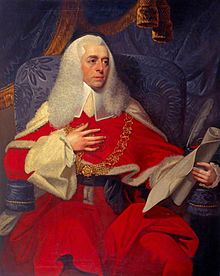
|
| Lord Alexander Wedderburn |
Franklin had published some letters he had promised not to publish, but they showed the British government in a very bad light. Alexander Wedderburn the Solicitor-General had deliberately orchestrated the meeting to shift the emphasis to Franklin's broken promise and away from British provocation of it. The room had been packed with highbrows promised a delicious treat, and Wedderburn's speech was meticulously planned as an entertainment for the intelligentsia. The man who discovered electricity was mocked as "conducting" the letters. And a famous man of letters was reminded that the ancient Athenians would brand three letters on the back of the hand of a thief: FUR, the name for a thief, an elaborate 18th Century pun making reference to fur hats and collars, which were the traditional symbol of printers. Wedderburn roused himself to the climactic announcement that the famous Roman, Plautus, had invented the famous derivative epithet, "Homo, triumph literarum," portentously meaning a three-letter man. The galleries of Whitehall tittered and applauded this thrilling attack. Franklin continued to stand, his face perfectly inscrutable to the end.
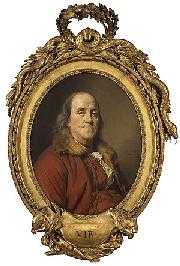
|
| Deplessis Portrait of Benjamin Franklin |
In his report back to the Massachusetts Legislature, Franklin used dismissive understatement to show he had not been asleep while he was impassive. He had been, he said, "the butt of his invective ribaldry for nearly an hour." After that, Poor Richard seemed to disappear from British society for nine months, seeing only close friends in his house, and then he sailed home to America, becoming a member of the Continental Congress the day he stepped off the boat. Meanwhile, he had arranged to have his portrait painted by Duplessis, the most distinguished painter in France, eventually to have it hang next to a painting by the same artist, of the King of France. To the original sketch for the portrait had been added a fur collar, the traditional emblem of the painter's guild. At the bottom, where a motto ordinarily would be found, was the single, three-letter Latin word, "VIR," or man, which would today be equivalent to he-man. And just so everyone would get the point, Franklin sent an otherwise anonymous letter to the newspapers, signed "Homo Triumph Literarum" in which he taunted that the friends of Mr. Franklin would have to agree he was a thief, as in the famous line of poetry that "He stole the lightning from the skies." But old Ben wasn't just bragging. Anticipating the baseball player Dizzy Dean by two hundred years, he was in effect saying "It ain't braggin' if you really have done it."
On Feb. 6, 1778 he and Silas Deane went over to the French palace to sign the Treaty of Alliance with the King of France. Instead of his usual brown suit, Franklin was wearing a faded blue one, and Deane questioned why he wore old clothes to such an important ceremony. "To give it a little revenge," was the answer. "I wore this suit on the day Wedderburn abused me at Whitehall." The true depth of Franklin's feelings would never have been known if Deane had not asked.
As a reminder, the Treaty they were signing said, "The essential and direct end of the present defensive alliance is to maintain effectually the liberty, sovereignty, and independence of the said United States. . . ." All in all, not a bad academic performance for a man who never went past the second grade in school.
REFERENCES
| The Invention of Air: A Story of Science, Faith, Revolution,and The Birth of America, Steven Johnson ISBN: 978-1-59448-852-8 | Amazon |
Two Hotheads May Have Destroyed an Empire

|
| King George III |
Combatants in a war often personalize the enemy in a single person. In 1776 the American colonists blamed it all on King George III. The British might have picked Sam Adams or Thomas Paine. Things are of course always vastly complicated in the affairs of great nations. Economics and national power are strong forces, like our culture, religion, and the accidents of geography and history. But when matters teeter on the edge of a cliff, insignificant pests can occasionally start an avalanche.

|
| Charles Townshend |
Consider first Charles Townshend, the Chancellor of England's exchequer in 1768. Townshend didn't particularly want the job, hoping instead for the Admiralty. None of the political power brokers particularly wanted to give him the job, but ultimately regarded it as the place he could do the least harm. He might have had no less an advisor than Adam Smith, who was the tutor of his son, but Smith's letters to him are so servile that it seems unlikely he would urge free trade to such a headstrong merchantilist employer. It is intriguing to speculate this strange association might have sharpened Smith's opinions in the Wealth of Nations which first appeared in 1776./p>
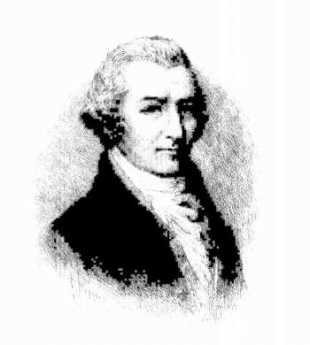
|
| William Bradford |
Townshend had been a problem all his life. His mother was brilliant, and notoriously promiscuous. He and his father exchanged 2000-word letters explaining to each other how the other was completely wrong. Charles was witty, eloquent and charming when he wanted to be, and he married an enormously wealthy woman. After that, his family had no hold on him, and they rarely spoke to each other. The same charm and arrogance can be perversely effective in politics, so other politicians often just had to put up with him. But as politicians do, they roasted him in their letters and private conversations. His political opponent, Edmund Burke, was perhaps a most gentle critic when he observed, "His actions... seem never to have been influenced by his most wonderful abilities." Opponents, of course, welcome deficiencies in their enemies, while exasperated political allies can be the most scathing about team members who injure the party with misbehavior. Adam Smith referred to his employer as someone "who passes for the cleverest fellow in England." Chase Price described him as "utterly unhinged". Horace Walpole: "nothing is luminous compared with Charles Townshend: he drops down dead in a fit, has a resurrection, thunders in the Capitol, confounds the Treasury bench, laughs at his own party, is laid up the next day, and overwhelms the Duchess [of Argyll, his mother-in-law] and the good women that go to nurse him!" The final assessment of his biographer Sir Lewis Namier was "...illustrations of Charles Townshend's character can be picked out anywhere during his adult life. He did not change or mellow; nor did he learn by experience; there was something ageless about him; never young, he remained immature to the end."
What matters for contemporary American readers is Townshend's 14-year grievance against American legislatures which seem to have originated when he discovered the New York Legislature in 1754 up to its old tricks of refusing to provide funds for Royal initiatives it did not like. At the time, he was in his first public office, the Board of Trade and Plantations, and had written some highly arrogant orders to New York, making many high-handed and disdainful public asides to his friends, including his wish to have the Assembly cut out of appropriations except for token approval of them. He was young, so his wiser party colleagues simply deflected him. But by 1767 he was Chancellor of the Exchequer, a brilliant speaker, and no doubt had collected many political chits to be cashed in. The Townshend Taxes were enacted, his underlying personal grievances were well known, the colonial assemblies could see it meant big trouble.
Although almost no one could match Townshend for bizarre behavior, in Philadelphia at Front and Market Streets, there was another difficult personality, named William Bradford. As a printer and newspaper publisher, Bradford must have been a person of some note in a town of thirty thousand, but it is difficult to find a portrayal of him, and notes about his personal life are comparatively skimpy. We do know that he was a member of a family of newspaper printers, including grandfather, uncle, and son, all of whom had experienced official prosecution for defiance of government. His grandfather, also named William Bradford, is said to have had Quaker affiliation, but it is not particularly prominent in accounts of him, while almost no mention of Quaker affiliation is made of the rest of the family. Grandfather William had a notable apprentice named John Peter Zenger, who was prosecuted for libel against the Royal Governor of New York, defended in a famous trial by the Philadelphia Lawyer Andrew Hamilton, who established the principle that the truth is not a libel. We can rather safely presume that the younger William Bradford had grown up in an environment of hostility to authority, aggravated but not necessarily caused by some rather plain persecutions by authority. It may even have been specific hostility to British authority, since in 1754 young Bradford began publication of a specifically anti-British paper, The Weekly Advertiser. It is interesting to note that its principle competitor was a pro-British paper printed by Ben Franklin. Somewhere along the line, Bradford became head of the Sons of Liberty, clearly marking him as strongly anti-British, probably well before the Townshend Acts.
Bradford established the London Coffee House at Front and Market Streets in Philadelphia. That might seem a strange sideline for a printer, until you reflect that the location was right beside the waterfront, especially the Arch Street warf. Newspapers in those days almost never had professional reporters, depending for their content on gossip from visiting ships. A coffee shop near the waterfront would be an excellent place to hear the maritime news of the world, and possibly hear it sooner than competitors. The London Coffee House provided a place for bargaining and trade; the Maritime Exchange got its start there. It may or may not be significant that a main activity of the Exchange was to buy and sell slaves. It is sure that the Navigation Acts and the Townshend taxes on various imports were a central topic of angry discussion in a waterfront Coffee House from 1768 to 1776. Thus it is possible that Bradford was caught up in the excited opinions of his customers, but plenty of evidence of anti-British sentiment exists in his background to suppose he nursed a long-standing prejudice against the British government. Our most authoritative account of the events appeared in the Pennsylvania Packet of January 3, 1774, but the beginnings of the story were better related in the Pennsylvania Mercury of October 1, 1791, shortly after Bradford's death.
"After the Tax on Tea imported into America was reduced to 3d. per pound by the British Parliament, there appeared to be a general disposition in the colonies to pay it. In this critical situation of the Liberties of America, Mr. Bradford stopped two or three citizens of Philadelphia, who happened to be walking by the door of his house on Front-street, and stated to them the danger to which our country was exposed, by receiving, and paying the tax on, the tea. Many difficulties stared the gentlemen, to whom he spoke, in the face...; and it was particularly mentioned that the citizens of Philadelphia were tired out with town and committee meetings, and that it would be impossible to collect a sufficient number of them together, to make an opposition to the tea respectable and formidable. 'Leave that business to me(said Mr. Bradford),--I'll collect a town meeting for you--Prepare some resolves;--and,--they shall be executed.' The next evening he collected a few of such citizens who were heartily opposed to the usurpations of the British Parliament, who drew up some spirited resolutions to reject the dutied tea, and to send back the tea ship. These resolutions were adopted the Saturday following (October 16, 1773), by a large and respectable town meeting at which the late Dr. Thomas Cadwalader (a decided Whig) presided. The same resolutions were immediately afterwards (November 5, 1773) adopted, nearly word for word, by a town meeting in Boston, where a disposition to receive the tea had become general, from an idea that opposition to it would not be seconded or supported by any of the other colonies. The events (December 16, 1773) which followed the adoption of these resolutions in the town of Boston are well known. However great the merit and sufferings of that town were in the beginning of the war, it is a singular fact, and well worthy of record in the history of the events which produced the American Revolution, the First act in that great business originated in Philadelphia, and that the First scene in it originated with Mr. William Bradford."
Written within a few days of the events, the January 3, 1774 Pennsylvania Packet is more detailed. In particular, the grievance is stated to be "...the pernicious project of the East India Company, in sending Tea to America, while it remains subject to a duty, and the Americans at the same time confined by the strongest prohibitory laws to import it only from Great Britain." While it is not easy to find a quotation capsulizing the British response, it would be something to the effect that the Tea Act was in fact a face-saving gesture which reduced the price of tea for the colonists, and was received as such by most of them, until smugglers of Dutch tea now faced the same surplus of unsold tea which had nearly bankrupted the East India Company after the colonies resorted to non-importation. Both arguments contain a certain amount of spin, but side-by-side, they contained sufficient reasonableness to permit peaceful resolution. To go on with the details:
"Upon the first advice of this measure, a general dissatisfaction was expressed, that, at a time when we were struggling with this oppressive act, and an agreement subsisting not to import Tea while subject to the duty, our subjects in England should form a measure so directly tending to enforce the act and again embroil us with our parent state. When it was also considered that the proposed mode of disposing of the Tea tended to a monopoly, ever odious in a free country, a universal disapprobation showed itself throughout the city. A public meeting of the inhabitants was held at the State-House on the [16]th October, at which great numbers attended, and the sense of the city was expressed in [the following] eight resolves:"
which we will divide into three sections for commentary. Resolves 1,2, and 5 can be said to be a protest against the Tea Act. While the language is a little high-flown, such a protest would be considered a normal exercise of free speech:
"1. That the disposal of their own property is the inherent right of freemen;that there can be no property in that which another man can, of right, take from us without our consent: that the claim of Parliament to tax America is, in other words, a claim of right to levy contributions on us at pleasure. "2. That the duty imposed by Parliament upon Tea landed in America is a tax on the Americans, or levying contributions upon them without their consent. "5. That the resolution lately enered into by the East India Company to send out their Tea to America , subject the payment of duties on its being landed here, is an open attempt to inforce this ministerial plan, and a violent attack upon the liberties of America. "
Resolutions 3. and 4. are accusations of a deeper plot. The colonists do not want to be taxed by the British Government directly, but prefer to tax themselves so that final payment to colonial officials must pass through colonial control. Unspoken, of course, is the creation of an ability to thwart implementation of unwelcome directives from London:
"3. That the express purpose for which the tax is levyed on the Americans, namely for the support of government, administration of justice, and defence of his Majesty's dominions in America, has a direct tendency to render Assemblies useless, and to introduce arbitrary government and slavery. "4. That a virtuous and steady opposition to this ministerial plan of governing America is absolutely necessary to preserve even the shadow of liberty, and is a duty which every freeman in America owes to his country, to himself, and to his posterity".
Finally, in the tradition of the writing of resolutions, come the so-called Resolves, the solution to the problem which you wish your audience to agree to. These concrete actions are found in resolutions 6, 7, and 8. The British could be expected to be offended, since the Resolves do not acknowledge the right of Parliament to impose the tax, or humbly petition that they reconsider. Rather, they assume the role of sovereign government themselves, effectively declaring the colonies would punish anyone who obeyed the Law, would coerce those who are charged by Parliament to implement the Law, and would cause those appointed by Parliament to do this work, to resign or else the peace would be disturbed by colonial enforcement of these 'suggestions':
"6. That it is the duty of every American to oppose this attempt. "7. That whoever shall, directly or indirectly, countenance this attempt, or in any wise aid or abet in the unloading,receiving and vending the Tea sent, or to be sent out by the East India Company, while it remains subject to the payment of the duty here, is an enemy to his country. "8. That a Committee be immediately chosen to wait on these gentlemen, who, it is reported , are appointed by the East India Company to receive and sell said Tea, and request them, from a regard to their own character, and the peace and good order of the city and province, immediately to resign their appointment."
The thinly-veiled threats contained in these resolutions against anyone who disagreed were soon made more explicit when the tea ship actually arrived at the mouth of the Delaware around December 23, 1773, by public posters to the Delaware River pilots and Captain Ayers of the incoming Tea ship, signed by THE COMMITTEE FOR TARRING AND FEATHERING. Cards were printed up for the public to distribute around the premises of James and Drinker, telling them to resign as sales agents for the Tea by writing a note, to be delivered to the London Coffee House -- William Bradford's place of business. A few shouts and the waving of a few torches would have been sufficient to indicate that the alternative was arson.
A month elapsed between the proclamation of the Philadelphia resolutions and the actual arrival of Captain Ayers in our harbor. Another tea ship had arrived at Boston in the meantime on December 16,1773. The Boston citizens had dressed themselves as Indians, and dumped the Boston Tea consignment into the harbor, proclaiming the same eight Philadelphia-written resolutions. But in Philadelphia, violence proved unnecessary. James and Drinker resigned their appointments as sales agents, the pilots were ready enough to impede passage, and Captain Ayers on December 27, 1773 meekly sailed his cargo of Tea back where it came from.
Differences of Quaker Opinion
A reader of Philadelphia Reflections feels that a balanced appraisal of the slavery issue should include mention of the Quakers who were determined in their opposition to abolition. After all, it took eighty years for the original concern of the Germantown meeting to be fully adopted by the Philadelphia Yearly meeting as a formal minute under the prodding of John Woolman. Since the minute gives permission for particularly concerned Friends to go speak with slave-holding Quakers, it is clear that even some Philadelphia Quakers held slaves and were reluctant to release them.
| ||
| Abraham Redwood 1709-1788 |
Newport, Rhode Island, was an even more awkward case. In colonial times, and even today to some degree, individual Yearly meetings were cordial, but under no formal obligation to respond to each other's decisions. The English seaport of Bristol had developed a sugar trade with the West Indies, and a number of Bristol Quakers moved to Newport. Acquiring very large sugar plantations in the Indies, they shipped molasses to rum distilleries in Newport or else directly back to Bristol where a candy industry had been established. The next step was the shipment of rum and/or trading trinkets to Africa, to be exchanged for slaves, who were taken to the Caribbean and exchanged for a cargo of molasses. Molasses then went to Newport, in a triangular trade pattern which admittedly avoided bringing slave cargo to Rhode Island, but whose principal purpose was taking advantage of the prevailing Atlantic trade winds while maintaining a full cargo over the whole distance. The largest partnership in this trade belonged to four Newport Quakers, one of whom was Abraham Redwood.
Redwood owned 230 slaves in Antigua and was among the richest men in America at the time. It is rather troubling to learn that the average "turnover" of slaves on Antigua was seven years, and that slave rebellions were fairly common. Redwood donated five hundred pounds to the Newport Philosophical Society for the purchase of 1300 books, thereby establishing the Redwood Library in 1747, one of the oldest in the country, although the Library Company of Philadelphia was established in 1731. By almost any standard, Redwood was nevertheless a "weighty" Quaker. When he resolutely refused to sell his slaves, he was "read out" of the meeting.
Details of the discussions which were conducted are no longer readily available, but it is obvious that collision of these two equally stubborn viewpoints was particularly awkward when it led to the banishment of the main employer of the town, and its most important local benefactor. Furthermore, those who worked harmlessly in the rum industry in Newport, or the candy industry in England, were called upon to reflect deeply on the unfortunate slave dealings in which they were, perhaps unknowingly, implicated.
Somehow all of this was accomplished without a total rupture, because thirteen years later Abraham Redwood donated another five hundred pounds to the Quaker Meeting, for the establishment of a school.
John Dickinson, Quaker Hamlet
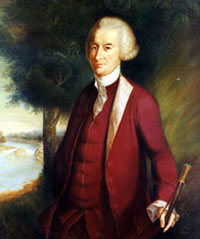
|
| John Dickinson |
John Dickinson (1732-1808) would probably be better known if his abilities were less complex and numerous. It would have been particularly helpful if he had consistently remained on only one side of the important issues of his day. Born in a Quaker family and buried in a Quaker graveyard, he was for years a notable Episcopalian and soldier. He outwitted John Penn, the Pennsylvania Proprietor who was trying to keep Pennsylvania from sending representatives to the Continental Congress, by having the Pennsylvania representatives hold a meeting in the same small room of Carpenters Hall at the same time as the Congress. But he ultimately refused to sign the Declaration of Independence. Although he was the main author of the Articles of Confederation, the Constitution which replaced it would not have been ratified without his idea of a bicameral Congress. Although he was Governor of Pennsylvania, he was also Governor of Delaware, has been the central figure in the separation of the two states. In fact, for fifteen years he was a member of the Legislature of both states. Dickinson seems in retrospect to have been on every side of every argument, but he was immensely respected in his time.
Two events seem to have been central in the organization of his life. The first was his education as a lawyer. At that time and for a century afterward, lawyers were trained by apprenticeship. Dickinson, however, studied in London at the Inns of Court for four years and was by far the most distinguished lawyer in North America for the rest of his life. Furthermore, he absorbed the principles of the Magna Carta and the approaches of Francis Bacon so thoroughly that he never quite got over his pride in his English heritage. Throughout his leadership of the colonial rebellion, he acted as a better Englishman than the English themselves. His demand was for American representation in the British Parliament, not independence from England. It would not be hard to imagine Dickinson standing before a firing squad, gritting the words of St. Paul, Civis Romani Sum.
His other pivotal experience was the Battle of Brandywine. Dickinson had been the organizer or chairman of the two main Pennsylvania military organizations, the Pennsylvania Committee of Safety and Defense, and the so-called Associators (today's 111th Infantry, the first battalion of troops in Philadelphia). Both of these particular names were a characteristic gesture to conciliating pacifist Quaker feelings. Nevertheless, when Dickinson refused to sign the Declaration, he did temporarily become so unpopular he resigned his military commands. A few months later, when General Howe landed at Elkton at the narrow neck of the Delmarva peninsula, Dickinson enlisted as a common soldier to defend the southern perimeter of the defense line Washington had hastily thrown up to defend Philadelphia. Shortly afterward, Dickinson's friend and neighbor Caesar Rodney made him a Brigadier General in charge of the garrison around Elizabeth New Jersey, but the Battle of Brandywine taught an important lesson. Little states like Delaware and Maryland could not possibly defend themselves witho
Pennsylvania Likes Private Property Private
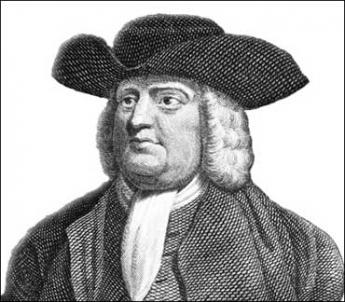
|
| William Penn Holding his Charter |
William Penn was the largest private landowner in America, maybe the whole world. He owned all of Pennsylvania, with the states of Delaware and New Jersey sort of thrown in. Although he and his descendants tried actively to sell off his real estate from 1684 to 1783, they still held an unsold three-fifths of it at the conclusion of the Revolutionary War, which they were forced to sell to the state for about fifteen cents per acre. This bit of history partly explains both the strong feeling this is private, not communal, land despite the existence of 2.3 million acres of the state forest system, which is affirmed right alongside the rather inconsistent feeling that raw land is somehow inexhaustible. Early settlers regarded the center of the state as poor farmland, particularly when compared with soil found in Lancaster and Dauphin Counties, or anticipated by settlers going to Ohio and Southern Illinois. A complimentary description is that glaciers descended to about the middle of Pennsylvania, denuding the northern half of topsoil which was then dumped on the southern part as the glaciers receded. Even today, farmers tend to avoid the northern region if they can, reciting the ancient advice from their fathers that "Only a Mennonite can make a go of it, around there."
So, lumbering had a century-long flurry in Central Pennsylvania, exhausting the trees and moving on. But that only related to the top layer of soil; beneath it lay anthracite in the East, and bituminous coal in Western Pennsylvania, supporting the steel industries of the two ends of the state with exuberant railroad development. Even today worldwide, hauling coal is the chief money-maker for railroads. The resulting availability of rail transport promotes the location of heavy industry near coal regions; the 20th Century decline of coal demand ultimately hurried the decline of heavy industry in the state by impairing the railroads.
Beneath all this lie the aquifers, porous caverns of fresh water. And beneath that, largely unsuspected for two centuries, lie the sedimentary deposits of a huge inland sea, compressed into petroleum which evaporates into natural gas. All of this is held by huge deposits of semi-porous shale rock, now mostly 8000 feet deep, stretching from Canada to Texas and called the Marcellus shale formation. If it can be economically recovered, there is more natural gas than in Arabia, and there is a similar formation along the near side of the Rocky Mountains in Colorado, stretching up to the Athabasca tar sands in Canada. There is another similar formation in France underneath Paris. No doubt, we will find the whole world has similar huge deposits for which the main problem has always been: how do you get it out?
There's another question, of course, of who owns it. Those who clearly do not own it maintain that everyone owns it. In the western world, most particularly in America, it is our firm belief that if you live on top of it, you own it. Since it is expensive to extract, quarrels like this are usually settled by purchasing mineral rights from the surface owner, who generally could not possibly extract it by himself. Those who assert they have a conflicting right to it because it belongs to everyone can expect belligerent resistance. At the present time when America faces a critical fifteen year period of dwindling oil supply, ultimately relieved by perfecting alternative energy sources, there is too little time to achieve consensus for any other governance theory. The problem which could possibly gain enough traction to interfere is the issue of potential damage to others which might result from the extraction of this subsurface treasure. Because of the apparent urgency of a decision to extract or go elsewhere to extract, the best we can hope for is some fairly rough justice.
Restoring the Gold Standard by Levering Judges' Salaries

|
| Gold Inflation |
Generally speaking, creditors hate inflation and favor a gold standard because they fear debtors -- who outnumber them at the polls -- will dishonor their debts by inflating the currency. And debtors generally are rather serene about the risk of inflation, for the same reason in reverse. Since governments are almost invariably debtors, the combination of government and debtors on the side of promoting inflation represents a dishearteningly strong force for creditors to combat. It is plain for everyone to see that inflation has been steadily moving ahead. But it is something for everyone to ponder that leaving creditors with only one recourse is almost certain to translate that particular recourse into action. Creditors will raise interest rates in anticipation of inflation, and the economy will suffer for debtors as well as everyone else.
So, hard-money advocates like the Paul family of Texas have been rather nonplussed to discover that Federal Judges have handed them in 2010 a very effective weapon they had long overlooked. It should be no surprise that it came from that direction; judges are long accustomed to looking backward to the historical origins of the laws they are charged with interpreting. In this case, the defining statement is found in the Declaration of Independence.
Parenthetically, conservatives are reluctant to include the Declaration in an explanation of the Constitution, since it is plainly true the Constitution was written to correct the weaknesses of the Articles of Confederation, which was much more closely defined by the circumstances of the Declaration. The almost immediate response to any such logical jump over the Constitution, particularly those of Abraham Lincoln, is to thump the maxim that The Declaration of Independence is not Law. And it isn't; it's just in this case it makes a concise statement of a major reason we were offended by the King of England:
"He has made judges dependent on his will alone, for the tenure of their offices, and the amount and payment of their salaries."
Note the operative phrase dependent on his will alone , which takes us back to the Magna Carta, where even the King must obey the Law. If judges are the umpires, it isn't in accord with deeply felt British culture that the King could force the umpires to favor his wishes in their official decisions, by threatening punishment on their persons. No, thousand times no. Anyone can see that.
Furthermore, the determination of underlying intent is so difficult to prove, and so easy to deny, that it is scarcely mentioned in the debate. If two motives seem possible, the other party will assert the high-sounding one and deny the ulterior one. The offended party will instinctively suspect the reverse and will brush aside any protestations to the contrary. Since that is bound to happen, please skip the preliminaries and get on with the evidence. So it is in this case; any reduction in the judge's salary is treated as an attempt to influence official decisions. The Administration maintains a reduction of Federal judge salaries is necessary for budgetary reasons. Please don't insult my intelligence that way. You aren't allowed to reduce the salaries of judges for any reason.
From this rather easy position to take, it is only a short step to say that refusing to raise judge salaries during inflation is a reduction of salary in real terms, after adjusting for inflation. Your paper money is phony; I want to preserve my purchasing power. Your refusal to adjust for inflation is even more clearly a salary reduction since the link to gold was severed during the Nixon and Johnson administrations. We are not on anything remotely resembling a gold standard; we are on a monetary standard which is by law adjusted to inflation, and just about nothing else. Hubert Humphrey may have thought he was creating a loophole by mandating concern with unemployment, but just try to convince the judges of the Supreme Court of that one.
And so, it seems predictable that Judge Beer of the Eastern District of Louisiana, and his fellow judges, will achieve an effective gold standard for Federal Judges if they have the fortitude to tough it out. After that, it gets harder, Congressman Paul. You have to push the concept that what is fair for Federal Judges is fair for everyone else. You should assume that judges will vote in their own favor, and therefore reasonably assume that the public will vote in its own favor, too. If that be treason, said Patrick Henry, make the most of it.
The March of Events
The Stamp Tax: Highly Innovative, Much Underestimated
One of the great books about Benjamin Franklin has just emerged, and it has an interesting current Philadelphia connection. Benjamin Franklin in London fills in the eighteen years Franklin spent in Europe, with many details and insights not possible to have with three thousand miles of ocean separating his activities from his home base. In fact, it raises the question of what was really his home in his own mind. Boston claims him because he was born there, but it takes a London writer to tell us he moved to Philadelphia because of disputes over vaccination for the smallpox epidemic, between his publisher brother and Cotton Mather. XX Goodwin, writer in residence at the Craven Street Ben Franklin Museum, will forever change our views about his subject. We hope he produces much more.
A word about the museum. The Craven Street house is the only Franklin residence still standing, restored with funds from Countess XX, Anthony Biddle's XXX, who unfortunately died this year. Her daughter, Charlotte Petropolis has an apartment in Philadelphia and regularly attends meetings of the Shakspere Society at the Philadelphia Club, which is itself the oldest club in America, and second oldest in the world, according to Matt Dupee, one of the local authorities on such matters, himself a member of a great many clubs around the world. To return to the original point, Goodwin is the beneficiary of this important interest by prominent Philadelphia families in our Founding Father.
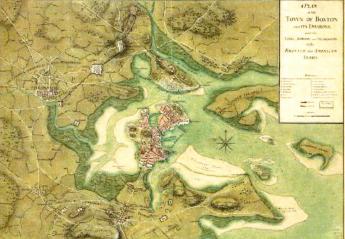
|
| Revolutionary Boston Reconsidered |
One gathers from the book that Franklin had considered himself a lifelong British subject, and from the Albany Conference of 17XX to his abject public humiliation in the "Cockpit" of Whitehall in 1775, nursed the hope that Great Britain and America would join in an empire as equals. He foresaw the growth of America, and expected the capital of the joint empire to move to America. After he returned to America, of course, the gauntlet had been thrown down, and he made it his task to enlist France on our side, bankrupting France and thus eventually provoking not one, but two national Revolutions. The French still think of him as their darling, but the lessons of the French Revolution taught Franklin some things he needed to know at the American Constitutional Convention of 1789. Letting others like Hamilton and Gouverneur Morris do the talking, his influence at dinners and private meetings put a stop to egalitarian babble and established a firmly Federalist nation. His activity in London would have won him a Nobel prize instead of fairy tales about kites and keys, he was friends with Mozart and Beethoven, plus about five kings. You don't humiliate a man like that without living to regret it, and King George III certainly regretted it in his saner moments.
Which, after three paragraphs, brings us back to the Stamp Tax of 17XX. To begin with, it isn't enough to want to do something, you must figure out a way to get it done. The early 18th Century colonists had learned that smuggling and counterfeiting would frustrate any tax plan for colonies so far away with diversified economies. The oceans were filled with pirates, sometimes described as privateers, and the American coastline was thousands of miles long. Furthermore, maintaining a large British navy from the Spanish Armada to the War of the Austrian Succession required thousands of British sailors, and the Navy had been stripped down to spare expense. So naturally the idea came up to have the colonies pay for their own defense at least, but how were you going to do it, in a way you could afford to continue?
A little digging in history would probably reveal the main author of the Stamp Tax Act, but such things are often the product of staff rather than the parliamentary member who introduced them. But it ingeniously solved the empire taxation problem. You just printed up the stamps and sold them, then required the objects of taxation to have a stamp pasted somewhere on them. You still would have to worry about smuggling and counterfeiting, but the whole thing was an inexpensive way of collecting the money and enforcing the tax. It even provided some nice patronage jobs for loyal stamp sellers.
Apparently, it was much too clever by half, since the colonists could immediately see what might be ahead of them. An uproar ensued, leading ultimately to repeal of the tax, except for a token tax on tea in order to preserve the principle. But the principle was exactly what bothered the colonists, and a tea tax wouldn't do, either. The rest is history, except I don't happen to know whose idea it really was. But I do know that Franklin was in London at the time, and Franklin's inclinations were strongly in favor of a combined British Empire. Franklin almost lost his job in this uproar, and some of his fellow colonists may have suspected his personal position on it.
Foreground: Parliament Irks the Colonial Merchants
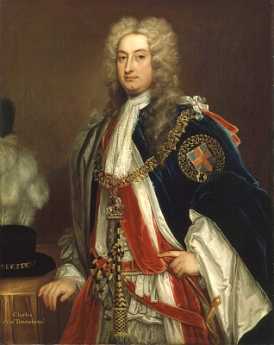
|
| Charles Townshend |
Charles Townshend, Chancellor of the Exchequer under King George III in 1766-67, had a reputation for abrasively witty behavior, in addition to which he did carry a grudge against American colonial legislatures for circumventing his directives when earlier he had been in charge of Colonial Affairs. His most despised action against the Colonies, the Stamp Act, seems to have been only a small part of a political maneuver to frustrate an opposition vote of no confidence. The vote had taken the form of lowering the homeland land tax from four to three shillings (an action understood to be a vote of no confidence because it unbalanced the budget, which he then re-balanced by raising the money in the colonies.) The novelist Tobias Smollett subsequently produced a scathing depiction of Townshend's heedless arrogance in Humphry Clinker, but at least in the case of the Stamp Act, its sting was more in its heedlessness of the colonies than vengeance against them. One can easily imagine the loathing this rich dandy would inspire in sobersides like George Washington and John Adams. After Townshend was elevated in the British cabinet, almost anything became a possibility, but it was a fair guess he might continue to satisfy old scores with the colonies. When King George's mother began urging the young monarch to act like a real king, Townshend was available to help. On the other hand, the Whig party in Parliament had significant sympathy with the colonial position, as a spill-over from their main uproar about John Wilkes which need not concern us here. Vengefulness against the colonies was not widespread in the British government at the time, but colonists could easily believe any Ministry which appointed the likes of Townshend might well abuse power in other ways before such time as the King or a more civilized Ministry could arrive on the scene to set things right. It was vexing that a man so heedless as Townshend could also carry so many grudges. Things did ease when Townshend suddenly died of an "untended fever", in 1767.
Whatever the intent of those Townshend Acts, one clear message did stand out: paper money was forbidden in the colonies. Virginia Cavaliers might be more upset by the 1763 restraints on moving into the Ohio territories, and New England shippers might be most irritated by limits on manufactures in the colonies. But prohibiting paper money seriously damaged all colonial trade. Some merchants protested vigorously, some resorted to smuggling, and others, chiefly Robert Morris, devised clever workarounds for the problems which had been created. Paper currency might be vexingly easy to counterfeit, but it was safer to ship than gold coins. In dangerous ocean voyages, the underlying gold (which the paper money represents) remains in the vaults of the issuer even if the paper representing it is lost at sea. Theft becomes more complicated when money is transported by remittances or promissory notes, so a merchant like Morris would quickly recognize debt paper (essentially, remittance contracts acknowledging the existence of debt) as a way to circumvent such inconveniences. In a few months, we would be at war with England, where adversaries blocking each other's currency would be routine. By that time, Morris had perfected other systems of coping with the money problem. In simplified form, a shipload of flour would be sent abroad and sold, the proceeds of which were then used to buy gunpowder for a return voyage; as long as the two transactions were combined, actual paper money was not needed. Another feature is more sophisticated; by keeping this trade going, short-term loans for one leg of the trip could be transformed into long-term loans for many voyages. Long-term loans pay higher rates of interest than short-term loans; it would nowadays be referred to as "riding the yield curve." This system is currently in wide use for globalized trade, and Lehman Brothers were the main banker for it in 2008. And as a final strategy, having half the round-trip voyage transport innocent cargoes, the merchant could increase personal profits legitimately, while cloaking the existence of the underlying gun running on the opposite leg of the voyage. If the ship is sunk, it can then be difficult to say whether the loss of such a ship was military or commercial, insurable or uninsurable. In the case of a tobacco cargo, the value at the time of departure might well be different from the value later. Robert Morris became known as a genius in this sort of trade manipulation, and later his enemies were never able to prove it was illegal. Ultimately, a ship captain always has the option of moving his cargo to a different port.
Other colonists surely responded to a shortage of currency in similar resourceful ways, including barter and the Quaker system of maintaining individual account books on both sides of the transaction, and "squaring up" the balances later but eliminating many transaction steps. Wooden chairs were also a common substitute as a medium of exchange. But "Old Square-toes," Thomas Willing, experienced in currency difficulties, and his bold, reckless younger partner Morris displayed the greatest readiness to respond to opportunity. Credit and short-term paper were fundamental promises to repay at a certain time, commonly with a front-end discount taking the place of interest payment. The amount of discount varied with the risk, both of disruption by the authorities, and the risk of default by the debtor. This discount system was rough and approximate, but it served. Quite accustomed to borrowing through an intermediary, who would then be directed to repay some foreign creditor, Morris, and Willing added the innovation of issuing promissory notes and selling the contract itself to the public at a profit. Thus, written contracts would effectively serve as money. A cargo of flour or tobacco represented value, but that value need only be transformed into cash when it was safe and convenient to do so.
The Morris-Willing team had already displayed its inventiveness by starting a maritime insurance company, thereby adding to their reputation for meeting extensive obligations; they established an outstanding credit rating. Although primarily in the shipping trade, the firm was also involved in trade with the Indians. There, they invented the entirely novel idea of selling their notes to the public, essentially becoming underwriters for the risk of the notes, quite like the way insurance underwriters assumed the risk of a ship sinking. Their reputation for ingenuity in working around obstacles was growing, as well as their credibility for prompt and reliable repayment. In modern parlance, they established an enviable "track record." A creditor is only interested in whether he will be repaid; satisfied with that, he doesn't care how rich or how poor you are. The profits from complex trading were regularly plowed back into the business; one observer estimated Robert Morris's cash assets at the start of the Revolution were no greater than those of a prosperous blacksmith. It didn't matter; he had credit.
In the event, this prohibition of colonial paper money did not last very long, so profits from it were not immense. But ideas had been tested which seemed to work. Today, transactions devised at Willing and Morris are variously known as commercial credit, financial underwriting, and casualty insurance. In 1776, Robert Morris would be 42 years old.
Lexington, Concord, and All That
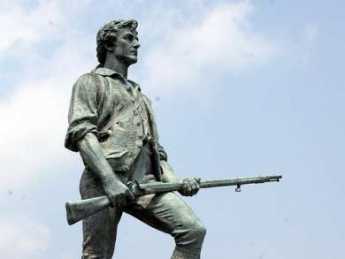
|
| Captain Parker, Minuteman |
American schoolchildren today, and maybe a majority of Americans even at that time, have found it bewildering that we declared independence fifteen months after the battles at Lexington, Concord, and Bunker Hill, well after George Washington besieged the British in Boston, or Benedict Arnold dragged the captured cannons of Ticonderoga over the mountains to save the day. Just who started our Revolution, and why; and for that matter, when, have been at issue for a long time.
John Adams and Thomas Jefferson exchanged hot correspondence for fifty years along these lines. Adams was miffed that Jefferson claimed all the credit for a defiant public resolution they both had a hand in writing, when real men in Boston had been getting shot and killed for Liberty years earlier, and Admiral Howe's fleet had even set sail for Staten Island long before that Declaration was printed. To which scolding, might well be added that Abraham Lincoln reached back to "all men are created equal" when he wanted to find Constitutional justification for what was only 3/5 true in 1787, and not true at all on Virginia plantations in 1776. And, of course, was a phrase not echoed in the Constitution. Yes, John Adams had a point, and Thomas Jefferson had other points. But weren't they both in Philadelphia at the same time, working on the same document? Jefferson and Adams were rather probably raking over the coals of the bitter 1800 election, where Jefferson turned Adams out of the White House, and Adams wouldn't even stay around for appearance sake to attend the inauguration of his successor. On another level, they were both likely thinking about the Constitution more than the Declaration of Independence, anyway. Jefferson never liked the Constitution, had been in France when it was written and preferred to submerge its precedence to a level of temporary revisions to the Declaration of Independence, which stressed unalienable human rights rather than a strengthened central government. It seems unfortunately true that politicians were introducing what is now called "spin". To the extent debate was heated rather than analytical, it could easily become immaterial whether 1774 was before or after 1776.
New England eased into rebellion with the Crown without a great deal of documentation of serious grievances; they must mostly be supposed. The fact that resentments were wide-spread lends substance to the idea that subjects of a remote monarchy had grown a little presumptuous, just as unsupervised Governors dispatched to rule them may have strutted authority unwisely. Successive generations of native-born colonists can be expected to have decreasing allegiance to the mother country, particularly after the need for protection from the French subsided, but irritation at quartering British troops persisted. Mercantilism is not intended to be fair; when imposed on foreigners there is more danger of provoking war when imposed on colonists, appeals to patriotism are mocked as self-serving. Unfortunately, Samuel Adams and John Hancock, the two main leaders of Massachusetts dissension, were not terribly clear about economics, and Hancock was definitely involved in some smuggling. Doctor Joseph Warren was more precise, but unfortunately died rather early. We assume competition in fishing off Newfoundland, and dominance in West Atlantic maritime trade seemed paramount to a region somewhat unsuited to agriculture. The English civil war left vivid memories of how quarrels could get out of hand. More than anything else, it would seem likely the British ministry decided to become more authoritarian, at a time when the colonists were drifting toward feeling more independent. They tested each other, and matters got out of hand.
The Old Dominion of Virginia had an established landed aristocracy, better able than in Massachusetts to say what the ruling class wanted, and what the state was going to do. Tobacco had started to wear out the Virginia soil, and people like Washington were anxious to acquire land in Ohio. This was blocked by a British prohibition of white men settling to the west of the Proclamation Line of 1763 along the Appalachian watershed, a separation intended to reduce friction with the Indians, concentrate English settlements along the seaboard for mercantile reasons, and direct further English immigration to Florida and Canada to hold back Catholic influences. The effect of the Proclamation on Virginians was varied, amounting at the least to feel they might just as well have lost the French and Indian War. The southern colonies were not in competition with England on manufacturing, but as agricultural exporters, were in frequent conflict with English merchants and bankers. Power and wealth were concentrated in fewer hands in the South, so personalities played a larger role in public policy.
The colonies were all growing rapidly, with a general sense that governance was getting cumbersome across a wide ocean. Benjamin Franklin was particularly ambitious for more level American versions of the United Kingdom, with Englishmen in the colonies of equal stature in Parliament and elsewhere. With skill, this could be the richest and most powerful nation on earth. As early as the Congress of Albany in 1754, Franklin was proposing a union of the colonies as a step toward full partnership with the British Isles in a transatlantic nation. He continued to pursue that sort of goal for twenty years. Variations of this idea were heard in Parliament. As a mechanism for riding the crest of the Industrial Revolution, this would have been a powerful arrangement for world domination, possibly but not necessarily including visions of world peace. In the Quaker colonies before 1774, Independence from England held little attraction, and merger with New England had less. After all, New England squabbles with Old England about Atlantic maritime trade brought attention to what most of it consisted of rum and slaves. Philadelphia Quakers had rallied around John Woolman to see the evil of slavery, and had largely succeeded in abolishing it locally. And Philadelphia Quakers were well aware that Quaker Abraham Redwood of Newport, Rhode Island had devised the famous triangular trade of slaves, molasses and rum. Pressure had built up within Quakerism to expel Redwood when he refused to free his slaves, no matter that he was probably the largest philanthropist of the colonies. Before that, relations between the Puritans and Quakers had often been difficult. Quakers believed in freedom of religion for everybody; the Puritans hanged Quakers. The Congregationalists of Connecticut had actually invaded the Wyoming Valley of Pennsylvania, three different times, the last of which was when Washington's army was wintering in Valley Forge. Furthermore, if we must attribute everything to economics, there was no land hunger in Pennsylvania. The Penn family, almost exclusively devoted to selling land, owned thirty million acres; by the time of the Revolution, they had only sold five million. The Penn family got along just fine with the Monarchy. The grievances up in New England were not entirely clear. Perhaps the Puritans should learn how to settle their differences in a more peaceful, and effective, way.
And then, Admiral Howe with a huge fleet of warships, and his brother General Howe with a huge army appeared at the beaches of New Jersey. They had orders to impose disciplined governance on every one of the colonies, right away.
Circular Letter: Boston Committee of Correspondance, May 1774
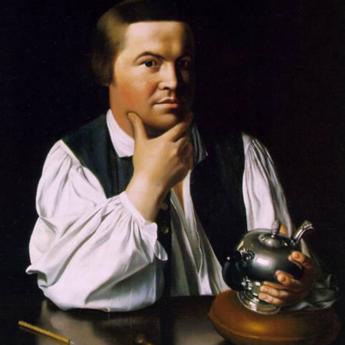
|
| Paul Revere |
"We have just received the copy of an Act of the British Parliament passed in the present session whereby the town of Boston is treated in a manner the most ignominious, cruel, and unjust. The Parliament has taken upon them, from the representations of our governor and other persons inimical to and deeply prejudiced against the inhabitants, to try, condemn, and by an Act to punish them, unheard; which would have been in violation of natural justice even if they had an acknowledged jurisdiction. They have ordered our port to be entirely shut up, leaving us barely so much of the means of subsistence as to keep us from perishing with cold and hunger; and it is said that [a] fleet of British ships of war is to block up our harbor until we shall make restitution to the East India Company for the loss of their tea, which was destroyed therein the winter past, obedience is paid to the laws and authority of Great Britain, and the revenue is duly collected. This Act fills the inhabitants with indignation. The more thinking part of those who have hitherto been in favor of the measures of the British government looks upon it as not to have been expected even from a barbarous state. This attack, though made immediately upon us, is doubtless designed for every other colony who will not surrender their sacred rights and liberties into the hands of an infamous ministry. Now, therefore, is the time when all should be united in opposition to this violation of the liberties of all. Their grand object is to divide the colonies. We are well informed that another bill is to be brought into Parliament to distinguish this from the other colonies by repealing some of the Acts which have been complained of and ease the American trade; but be assured, you will be called upon to surrender your rights if ever they should succeed in their attempts to suppress the spirit of liberty here. The single question then is, whether you consider Boston as now suffering in the common cause, and sensibly feel and resent the injury and affront offered to here. If you do (and we cannot believe otherwise), may we not from your approbation of our former conduct in defense of American liberty, rely on your suspending your trade with Great Britain at least, which it is acknowledged, will be a great but necessary sacrifice to the cause of liberty and will effectually defeat the design of this act of revenge. If this should be done, you will please to consider it will be, though voluntary suffering, greatly short of what we are called to endure under the immediate hand of tyranny.
"We desire your answer by the bearer; and after assuring you that, not in the least intimidated by this inhumane treatment, we are still determined to maintain to the utmost of our abilities the rights of America, we are, gentlemen,
"Your friends and fellow countrymen."
REFERENCES
| Paul Revere & The World He Lived In | Amazon |
Declaration of Rights of the Continental Congress, October 14, 1774
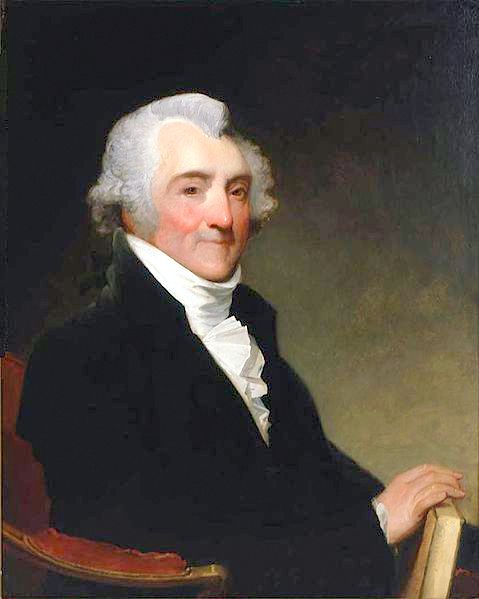
|
| John Sulllivan |
Whereas, since the close of the last war, the British Parliament, claiming a power of right to bind the people of America, by statute, all cases whatsoever, hath in some acts expressly imposed taxes on them and in others, under various pretenses, but in fact for the purpose raising a revenue, hath imposed rates and duties payable in these colonies established a board of commissioners, with unconstitutional powers, and extended the jurisdiction of courts of admiralty, not only for collecting the said duties but for the trial of causes merely arising within the body of a county.
And whereas, in consequence of other statutes, judges, who before held only estates at will in their offices, have been made dependent on the Crown alone for their salaries, and standing armies kept in time of peace:
And whereas it has lately been resolved in Parliament, that by force of a statute, made in the thirty-fifth year of the reign of Henry the Eighth, colonists may be transported to England, and tried there upon accusations for treasons, and misprisions, or concealments of treasons committed in the colonies, and by a late statute, such trials have been directed in cases therein mentioned.
And whereas, in the last session of Parliament, three statutes were made; one, entitled "An act to discontinue, in such manner and for such time as are therein mentioned, the landing and discharging, lading, or shipping of goods, wares, and merchandise, at the town, and within the harbor of Boston, in the province of Massachusetts Bay, in North America"; and another, entitled "An act for the better regulating the government of the province of the Massachusetts Bay in New England"; and another, entitled "An act for the impartial administration of justice, in the cases of persons questioned for any act done by them in the execution of the law, or for the suppression of riots and tumults in the province of the Massachusetts Bay, in New England." And another statute was then made, "for making more effectual provision for the government of the province of Quebec, etc." All which statutes are impolitic, unjust and cruel, as well as unconstitutional, and most dangerous and destructive of American rights.
And whereas, assemblies have been frequently dissolved, contrary to the rights of the people, when they attempted to deliberate on grievances; and their dutiful, humble, loyal, and reasonable petitions to the Crown for redress, have been repeatedly treated with contempt by His Majesty's ministers of state:
The good people of the several colonies of New Hampshire, Massachusetts Bay, Rhode Island and Providence Plantations, Connecticut, New York, New Jersey, Pennsylvania, New Castle, Kent and Sussex on Delaware, Maryland, Virginia, North Carolina, and South Carolina, justly alarmed at these arbitrary proceedings of Parliament and administration, have severally elected, constituted, and appointed deputies to meet and sit in general congress, in the city of Philadelphia, in order to obtain such establishment, as that their religion, laws, and liberties may not be subverted.
Whereupon the deputies so appointed being now assembled, in a full and free representation of these colonies, taking into their most serious consideration, the best means of attaining the ends aforesaid, do, in the first place, as Englishmen, their ancestors in like cases have usually done, for asserting and vindicating their rights and liberties, declare, That the inhabitants of the English colonies in North America, by the immutable laws of nature, the principles of the English Constitution, and the several charters or compacts, have the following rights:
Resolved, N. C. D. [Nemine contradicente, no person disagreeing]1. That they are entitled to life, liberty, and property, and they have never ceded to any sovereign power whatever, a right to dispose of either without their consent
Resolved, N. C. D. 2. That our ancestors, who first settled these colonies, were at the time of their emigration from the mother country, entitled to all the rights, liberties, and immunities of free and natural-born subjects, within the realm of England.
Resolved, N. C. D. 3. That by such emigration they by no means forfeited, surrendered, or lost any of those rights, but that they were, and their descendants now are, entitled to the exercise and enjoyment of all such of them, as their local and other circumstances enable them, to exercise and enjoy.
Resolved, 4. That the foundation of English liberty, and of all free government, is a right in the people to participate in their legislative council: and as the English colonists are not represented, and from their local and other circumstances, can not properly be represented in the British Parliament, they are entitled to a free and exclusive power of legislation in their several provincial legislatures, where their right of representation can alone be preserved, in all cases of taxation and internal polity, subject only to the negative of their sovereign, in such manner as has been heretofore used and accustomed. But, from the necessity of the case, and a regard to the mutual interest of both countries, we cheerfully consent to the operation of such acts of the British Parliament, as are bona fide, restrained to the regulation of our external commerce, for the purpose of securing the commercial advantages of the whole empire to the mother country, and the commercial benefits of its respective members; excluding every idea of taxation, internal or external, for raising a revenue on the subjects in America, without their consent.
Resolved, N. C. D. 5. That the respective colonies are entitled to the common law of England, and more especially to the great and inestimable privilege of being tried by their peers of the vicinage, according to the course of that law.
Resolved, N. C. D. 6. That they are entitled to the benefit of such of the English statutes as existed at the time of their colonization; and which they have, by experience, respectively found to be applicable to their several local and other circumstances.
Resolved, N. C. D. 7. That these, His Majesty's colonies, are likewise entitled to all the immunities and privileges granted and confirmed to them by royal charters, or secured by their several codes of provincial laws.
Resolved, N. C. D. 8. That they have a right peaceably to assemble, consider of their grievances, and petition the King; and that all prosecutions, prohibitory proclamations, and commitment for the same, are illegal.
Resolved, N. C. D. 9. That the keeping a standing army in these colonies, in times of peace, without the consent of the legislature of that colony, in which such army is kept, is against law.
Resolved, N. C. D. 10. It is indispensably necessary to good government, and rendered essential by the English constitution, that the constituent branches of the legislature be independent of each other; that, therefore, the exercise of legislative power in several colonies, by a council appointed, during pleasure by the Crown, is unconstitutional, dangerous, and destructive to the freedom of American legislation.
All and each of which the aforesaid deputies, in behalf of themselves and their constituents, do claim, demand, and insist on, as their indubitable rights and liberties; which cannot be legally taken from them, altered or abridged by any power whatever, without their own consent, by their representatives in their several provincial legislatures.
[Author: John Sulllivan, Delegate and later Governor, New Hampshire]
REFERENCES
| A Familiar Exposition of the Constitution of the United States: Containing a Brief Commentary on Every Clause, Explaining the True Nature, Reasons, and ... Designed for the Use of School Libraries and General Readers; Joseph Story: ISBN-13: 978-1886363717 | Amazon |
Unalienable Rights Before 1776
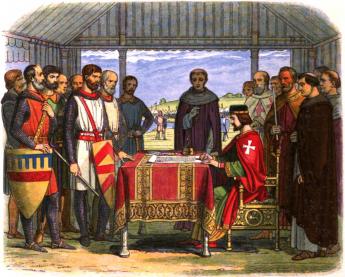
|
| Magna Carta |
In 1976, the bicentennial birthday celebration of the Declaration of Independence contained two major exhibits of its conceptual origins. Mr. H. Ross Perot of Texas loaned his copy of the 1215 Magna Carta, and the Proprietors of West Jersey loaned their 1677 original of William Penn's Concessions and Agreements to the colonists of New Jersey. The purpose of the exhibit was to emphasize the historical origins of the concepts within the Declaration, but even the language of the Concessions is remarkably similar, quite evidently lifted by Jefferson when he was writing. On one point, Penn had the better of Jefferson; he correctly wrote about inalienable rights, while somehow Jefferson gave us unalienable ones.
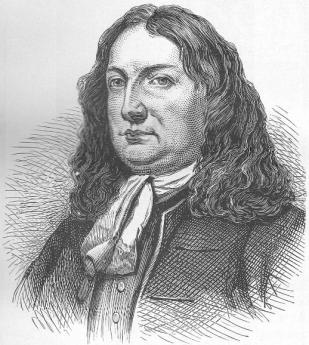
|
| William Penn |
The matter came up recently at a Socrates meeting of the Right Angle Club, where at least one member felt there was no such thing as a natural right, while others wavered. In discussing the rights which the Creator, William Penn and/or Thomas Jefferson may have given us, the various contexts must be held in mind. At the time of declaring our intention to sever relations with Britain's King, there was no Constitution to refer to as a source, and it was impolitic to assert the rights had been given by English kings, like King John. Therefore, the language cleverly short-cuts around the divine right of kings to make a direct connection between the Creator and the colonists. William Penn on the other hand, was a real estate promoter, offering enticements and assurances to prospective colonists who were naturally fearful of risking their lives in sailboats, only to face the possible tyranny of a vassal king who might be even worse than the anointed one. Not only did Penn renounce any suggestion of a Royal role for himself, but went to considerable length describing the legally binding concessions and agreements he was offering. The right of trial by jury, for example, became a right to be punished only by a jury of twelve of one's neighbors. He wasn't talking to lawyers, he was making important distinctions very clear to laymen. These were not rights given by a Divinity who could be trusted, nor something which grew out of Mother Nature. They were the personal promises of William Penn, in personal legal jeopardy of the English courts if he reneged on them. He even had a ready answer for those who discovered the religious language in legal documents -- the Quaker belief that, occasional appearances to the contrary notwithstanding, There is That of God, in every man.
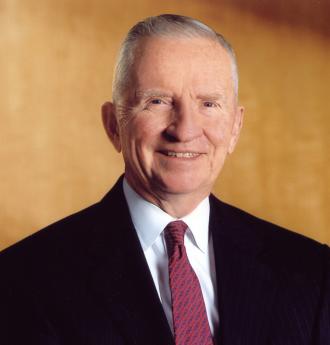
|
| H. Ross Perot |
As a small sidelight of the Concessions document, it had long been housed in the little brick hut on Main Street in Burlington NJ, where the Proprietors of West Jersey keep their treasures. The obscurity of these papers was probably their best protection, but the risk of displaying them in Philadelphia at the centennial brought out the need to ensure them, hence to appraise their value. The figure of four million dollars was kicked around. Ross Perot might have felt comfortable with this sort of expense as the natural cost of being a rare book collector, but it seemed highly unnatural to Quakers. Sometime afterward, the Surveyor General, William Taylor, was awakened by a call from Burlington neighbors that someone was trying to break in the roof to steal contents of the Proprietorship building. The burglars were unaware that underneath the shingles, the roof was actually made of concrete a foot thick. So the perps were frustrated in their aims, but Bill Taylor was greatly troubled by the implications, actually unable to sleep at night worrying about what was in his custody. So, in time the State of New Jersey constructed a suitable archives building, and the valuable documents were transferred up to Trenton. Time will tell what the Soprano State does with such a valuable possession, but at least the Quakers can now sleep at night.
Three Revolutions at Once, Maybe Four
The rise of the Tea Party movement in 2010 reopens a lifetime question in my mind. What was the American Revolutionary War all about; surely, a tax on tea isn't outrageous enough to go to war over, is it? It only aggravates curiosity to learn this particular law passed by the British Parliament, actually lowered the price of tea.
A somewhat different importance for the 21st Century is, of all the dozens or even hundreds of little civil wars that have popped up in the past two centuries, this American one seems to have had the biggest impact on the thoughts and behavior of the civilized world. The French Revolution comes close, but we meant to speak of persuasive influence on serious minds, not merely bloodiness and lasting grievance. Here are three suggestions, maybe four.
In retrospect, we can see the outlines of three major revolutions, coming together at the end of the 18th Century. The first is the Industrial Revolution, which had its beginnings in England around the city of Manchester. That was a region of major Quaker concentration, many of whom migrated to William Penn's social experiment in seeing what peace could do. The Industrial Revolution flourished in Great Britain far more readily than in France, and in a sense more than in America. But of the three major countries, America had the largest amount of unsettled land and the greatest natural resources of the three major countries. America was able to think bigger and broader, necessarily requiring broad support from an immigrant population. Diversity was often later to prove a mixed blessing, but in the Industrial Revolution it was vital.

|
| Dissent, French Style |
The second major revolution taking place at that time concerned the place of property in the life of every citizen. Up until that time, the King owned all the land and could redistribute it to suit his political needs. What critically mattered was not who formerly owned the land, but rather what was the latest King's latest word on who owned it right now. The American system gravitated to the notion that when the King or any other owner sold the land, it was no longer his; we now think that's quite self-evident. Each successive owner can sell it to his neighbor or bequeath it to his heirs, and at that moment it is no longer his, either. This idea of private property spread throughout the world, but in America, it was a clean sweep. Adopting the rather brutal rough justice of the frontier, the Indian prior ownership just didn't count. They had sided with the British in our revolution and were insistently resistant to assimilation. And anyway, Pope Nicholas in the 13th Century had established the notion of first discovery, which applied to Christians, only, and so Indians didn't count. Fair or unfair, this was going to be the way it was, from that point forward from 1787 when the Constitution was enacted. The longer the situation lasted, the more unlikely it became that it would ever change. America had so much land and so little coinage, that land itself became a sort of monetary standard. The particular American advantage was there was so much land that early settlers and landed gentry could not monopolize it; from meaning land at first, property soon meant any valuable possession. No King, particularly not George III, was going to take this away from the whole population on this side of the Atlantic. England could do as it pleased with its land and its King. If we needed Independence to preserve a general right to hold private property, plenty of men were willing to die to achieve it. And the whole Western world soon followed our example.
The third revolution was the one you read about, Lexington and Concord, Bunker Hill and the Tea Act. That whole chain of events chronicles how America came to be Independent but somehow fails to explain why we wanted Independence. The Industrial and the Property revolutions explain it better, but such theorizing would certainly mystify the Revolutionaries themselves.
And finally, one begins to wonder if we aren't toying with a reversion to the ideas underlying monarchy when we examine some currently widespread views. There's a notion going about that everybody owns everything, which if carried to an extreme means no one owns anything. When you can notice people who live on the 70th floor of a Manhattan apartment building, proclaiming a right to tell Alaskans whether or not they can drill for oil, you behold this monarchy of the many. And when you see prosperous educated adults shouting at rallies, you can see Alaskans, for example, want to tell New Yorkers to mind their own business. This land, they seem to say, isn't everybody's at all, it is mine.
It never really was entirely the King's, either. The King was a single person, sometimes a rather brutal one who wasn't likely to tolerate advice from his subjects. At times of crisis, somebody has to make a decision, any decision, and act on it. But most of the time, kings seemed to be in the position of that Czar. The one who said, "I don't rule Russia. Ten thousand clerks rule Russia."
Philadelphia in '76
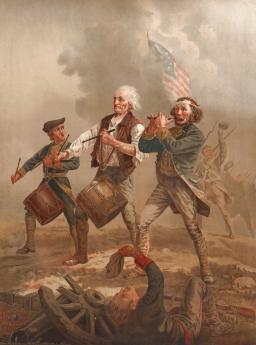
|
| Spirit of '76 |
Although the origins of the American Revolution are subtle and complex, even historically controversial, we have more or less united in the idea that we "declared" our independence from Britain on July 4, 1776. We then spent eight years convincing the British we were serious and have been independent ever since. Reflect, however, on the fact that fighting had been going on for a year in Massachusetts, and that Lord Howe's fleet had set sail a month before the Declaration, actually landing on Staten Island at just about the same time as the Fourth of July. Add to that the fact that only John Hancock actually signed the document on July 4th, and some of the signers waited until September. You can sort of see why John Adams never got over the idea that Thomas Jefferson had quite a nerve implying the whole thing was his idea. What's more, New England subsequently had to live with a President from Virginia for thirty-two of the first thirty-six years of the new nation. Philadelphia may have been the cradle of Independence, but that was not because it was a colony hot for war, dragging the others along with it. It was the largest city in the colonies, centrally located. It had a strong pacifist tradition, and it had the most to lose from a pillaging enemy war machine.
New England was in the position of having started hostilities, and about to be subdued by overwhelming force. The Canadians were not going to come to their aid, because they were French, and Catholic, and enough said. What the New Englanders wanted was WASP allies, stretching for two thousand miles to the South. By far the largest colony was Virginia, which included what is now Kentucky and West Virginia; it even had some legal claims for vastly larger territory. The rest of the English colonies had plenty of assorted grievances against George III, and almost all of them could see that America was rapidly outgrowing the dependency on the British homeland, without any sign that Parliament was ever going to surrender home rule to them. Perhaps it was unfortunate that New Englanders were so impulsive, but it looked as though a confrontation with the Crown was inevitably coming, and without support, New England was likely to be subdued like Carthage.
And then, the last hope for flattery and diplomacy, for guile and subtlety, stepped off the boat. Benjamin Franklin, our fabulous man in London, had it "up to here" with the British ministry. He finally was saying what others had been thinking. It was now, or never.
What Happened in Philadelphia on July 4, 1776?
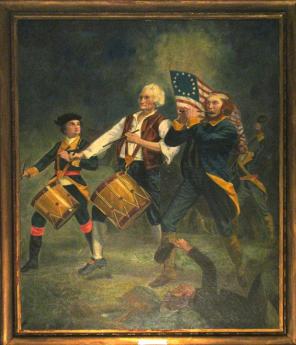
|
| Spirit of 76' |
The American colonies were growing too big, too fast, and the British Empire had too many international distractions, to have smooth relationships across three thousand miles of ocean, using uncertain communications available in the late Eighteenth century. Friction and misunderstanding were inevitable without far more statesmanship than either side thought was necessary. So, when the Continental Congress dispatched George Washington to Boston with troops to defend rebellious Massachusetts at Lexington, Concord, and Bunker Hill, it was hard for the British to believe the colonists were merely helping out one of their distressed neighbors. It seemed in London that the thirteen colonies had united, formed not only an army but a government, and gone to war. In December 1775 England passed the Prohibitory Act, essentially declaring war, and organized a huge invasion fleet to put down the rebellion. It now seems hard to understand the first notice the Americans had of this huge over-reaction was a private letter to Robert Morris from one of his agents in March 1776; no warnings, no negotiations, no attempt to investigate problems and correct them. The British just sent a fleet to settle this problem, whatever it was. It's all very well to say the Americans should have known they were playing with fire. They didn't see it that way; they were being self-reliant, responding to attack. In June 1776 British patrol frigates were skirmishing in the Delaware River; late in the month, British troops landed on Staten Island. The American reaction to all this was a muddle of confusion. A few were delighted, most of the rest were amazed or appalled.
Although the deeper strategic origins of the American Revolution are subtle, complex, and controversial, there is far less muddle about what happened on July 2, 1776, publicly proclaimed two days later. Adopting a resolution written by Richard Henry Lee of Virginia, the Thirteen Colonies stated they had now clarified their goals in the controversy with the British monarchy. For a year before that, the Continental Congress had been corresponding with each other and meeting in Carpenters Hall with the goal of achieving representation in the British parliament -- "No taxation without representation". The model for most of them was based on the Whig agitation for Ireland -- for a local parliament within a larger commonwealth. But the passing of the British Navy in Halifax, Nova Scotia, and then the actual appearance of seven hundred British warships in American waters showed that not only was Parliamentary representation out of the question, but King George III was going to play rough with upstarts. The new goal was no longer just representation, it was independence. If we were going to resist a military occupation at the risk of being hanged as traitors, we might as well do it for something substantial. The meeting had a number of Scotch-Irish Princeton graduates, whose basic loyalty to England had long been divided. Pacifist Pennsylvania, chief among the wavering hold-outs, was mostly won over by its own Benjamin Franklin, who was optimistic the French would help us. Even so, both Robert Morris and John Dickinson refused to sign the Declaration; Franklin persuaded both to abstain by absence, which created a majority of the Pennsylvania delegation in favor. That's a pretty slim majority for a crucial decision. Franklin was soon dispatched back to Paris to make an alliance; Washington was dispatched to hold off that British army in the meantime. Jefferson was designated to write a proclamation, which even after editing is still pretty unreadable beyond the first couple of sentences. Meeting adjourned. This brief account may not qualify as a serious examination of the causes of the American Revolution, but it comes close to the way it seemed to the colonist in the street.
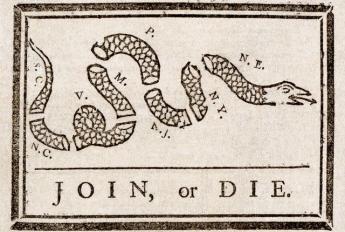
|
| Colonist's Complaint |
The rebels then spent eight years convincing the British they were serious and have been independent ever since. But, just a minute, here. Reflect on the fact that fighting had been going on for a year in Massachusetts, and that Lord Howe's fleet had set sail a month before the Declaration, actually landing on Staten Island at just about the same time as the Fourth of July. Add the fact that only John Hancock actually signed the document on July 4th, and some of the signers even waited until September. You can sort of see why John Adams never got over the idea that Thomas Jefferson had a big nerve implying the whole Revolution was his idea. What's more, there's a viewpoint that New England subsequently had to endure a President from Virginia for thirty-two of the first thirty-six years of the new nation because loud talk from New England still made the rest of the country nervous. Philadelphia may have been the cradle of Independence, but that was not because it was a colony hot for war, dragging others along with it. Rather, it was the largest city in the colonies, centrally located. It had a strong pacifist tradition, and it had the most to lose from a pillaging enemy war machine. When Independence was finally declared the goal, many of Philadelphia's leading citizens moved to Canada.
New England had started hostilities and was about to be subdued by overwhelming force. The Canadians were not going to come to their aid, because they were French, and Catholic, and enough said. What New England and the Scotch-Irish needed were WASP allies, stretching for two thousand miles to the South. By far the largest colony was Virginia, which included what is now Kentucky and West Virginia; it even had some legal claims for vastly larger territory. Virginia was incensed about its powerlessness against British mercantilism, especially the tobacco trade. The rest of the English colonies had plenty of assorted grievances against George III, and almost all of them could see that America was rapidly outgrowing dependency on the British homeland, without a sign that Parliament was ever going to surrender home rule to them. It was perhaps unfortunate New Englanders were so impulsive, but it looked as though a military confrontation with the Crown was inevitably coming. Without support, New England was likely to be torched, as Rome once subdued Carthage.
And the last hope for an alternative of flattery and diplomacy, for guile and subtlety, had stepped off the boat a year earlier. Benjamin Franklin, our fabulous man in London, arrived with the news he had finally had it "up to here" with the British ministry. He was a man who quietly made things happen, carefully selecting his arguments from amongst many he had in mind. In retrospect, we can see that he held the idea of Anglo-Saxon world domination as far back as the Albany Conference of 1745, and could even look forward to America outgrowing England in the 19th Century. His behavior at the Constitutional Convention of 1787 strongly suggests he never completely gave up that long-term dream. Just as Edmund Burke never gave up the idea of Reconciliation with the Colonies, Benjamin Franklin never quite gave up the idea of Reconciliation with England. While John Dickinson and Robert Morris resisted the idea of Independence down to the last moment, Franklin took a much longer view. For the time being, it was necessary to defeat the British, and for that, we needed the help of the French. In 1750, America joined with the British to toss out the French. And then in 1776, we joined the French to toss out the British. Franklin didn't always get his way. But Franklin was always steering the ship.
Grand Union
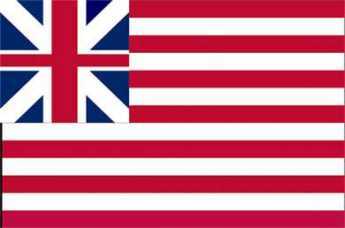
|
| Grand Union Flag |
THERE are a number of supermarkets in Philadelphia called Grand Union Stores, but the grocery conglomerate was founded in 1872. That Union was the Northern side in The American Civil War, and it is reported that life-sized replicas of Abraham Lincoln were once a common feature in the stores. Much earlier than that, the Grand Union was a term that meant the first American national flag, adopted in 1775, and created by a Philadelphia milliner, Margaret Manny. It was, however, quite similar to the flag of the British East India Company, and the Grand Union they were both talking about was the Union of England and Scotland of 1707. The jack of the Grand Union flag, soon to be replaced with a ring of thirteen stars, represented the crosses of England and Scotland, superimposed. When Northern Ireland joined the United Kingdom, the cross of Ireland was superimposed, to give the present form of the Union Jack. In 1775, the considerable colonial sentiment still hoped that hostilities would achieve a status for America along the lines of the other members of the United Kingdom.
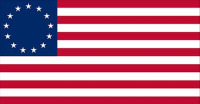
|
| "Betsy Ross" Flag |
Although the number of stripes in the national flag briefly increased to fifteen at the time of admission of Kentucky and Vermont, stripes soon reverted to thirteen to symbolize the original thirteen states. After that single exception, only the stars in the jack increased to match the number of current states.
The early use of the Grand Union Flag is in some dispute, but it may possibly have been used by George Washington in the various battles around Boston and Charlestown. It was most certainly flown by John Paul Jones on his ship the Alfred . Because of its resemblance to the flag of the nation we were fighting to overthrow, it is understandable that there would soon be a desire to change it. That is what happened in 1777, although just who first had the idea is still open to dispute and myth-making.
America has had three flag acts:
The Flag Act of June 14, 1777 was passed by the Second Continental Congress (under the Articles of Confederation, of course. June 14 is now called Flag Day.) "Resolved, That the flag of the United States be made of thirteen stripes, alternate red and white; that the union be thirteen stars, white in a blue field, representing a new Constellation."
The Flag Act of January 13, 1794 (1 Stat. 341) An Act making an alteration in the Flag of the United States. Be it enacted by the Senate and House of Representatives of the United States of America in Congress Assembled, That from and after the first day of May, Anno Domini, one thousand seven hundred and ninety-five, the flag of the United States, be fifteen stripes alternate red and white. That the Union be fifteen stars, white in a blue field.
The Flag Act of April 4, 1818 (3 Stat. 415) An Act to establish the flag of the United States. Be it enacted by the Senate and House of Representatives of the United States of America, in Congress Assembled, That from and after the fourth day of July next, the flag of the United States be thirteen horizontal stripes, alternate red and white: that the union be twenty stars, white in a blue field. And be it further enacted, That on the admission of every new state into the Union, one star be added to the union of the flag; and that such addition shall take effect of the fourth day of July then next succeeding such admission.
State in Schuylkill Fishing Club
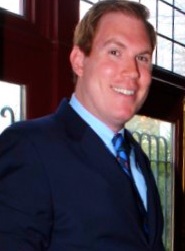
|
| Richard Romm |
Richard Romm, a rising historical scholar with a special interest in early Philadelphia, recently educated the Right Angle Club in the history of the Schuylkill Fishing Club in the State in Schuylkill, and was immediately accepted into membership. Of the Right Angle, that is, which is an old club by some standards, but scarcely a hundred years old in the eyes of the really old, old clubs.
The State in Schuylkill is an eating club, originally a fishing and eating club, apparently organized around the annual shad run up the river. The clubhouse, or Castle, was moved several times, in response to damming of the river, and is now located on the grounds of, or adjoining the edge of, Nicholas Biddle's estate on the Delaware River called Andalusia. One by one, the Atlantic Ocean rivers of America have been dammed and their annual shad migrations brought to an end, except through the city of Richmond, Va, so there was little point in moving The Castle to follow the fish. It remains, overlooking Delaware in spite of its name.
There seems to have been several name changes, the most important of which was to change the Colony of Schuylkill to the State of Schuylkill for obvious reasons. Originally, the Castle was roughly opposite the falls of Fairmount on the West Bank of the Schuylkill at about Girard Avenue; thus, from 1732 to 1822 located on Baron Warner's property called Eaglesfield. In 1822 it moved to Rambo's Rock (the Rambo family is said to be the oldest European settler family in Pennsylvania) opposite Bartram's Gardens, then finally in 1887 to Andalusia, Nicholas Biddle's country estate. The club was founded in 1732, and dates of movings are possibly hazy, possibly somewhat because of the reluctance of club officers to return the calls of inquiring historians. The State in Schuylkill claims to be the oldest organized men's club in the world, an honor contested by White's in London. The roots of this argument are found tangled in the vital issue of whether their age should be based on the formal organization of the clubs, or on the establishment of the coffee houses which housed the original clubs. Four books are said to have been written about club history, but we depend here on Mr. Romm.
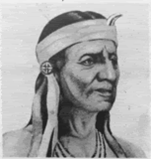
|
| Chief Tammenend |
There is also an unclear relationship with Chief Tammenend, possibly traceable to the shad run, but in any event to the Indian chief depicted with William Penn in the paintings by Benjamin West and Edward Hicks. May 1 is St. Tammany's day, growing into the fancy that he was the "Patron Saint of America", before a branch of the nation-wide Tammany association opened in New York and sort of tarnished up the name. Other traditions of the Fishing club have to do with wearing Mandarin hats, possibly having to do with the export of ginseng which was once abundant in our colonial suburbs, with a return cargo of Chinese dishware. All of the cooking is done by official citizens of the club. The quantities of food are remarkable; one 19th Century menu listed eleven pounds of meat per member. The club drink is a punch, the famous Fishhouse Punch, widely recognized to be rather strong. Its inventor is reputed to be Edward Shippen Willing, on the occasion of the first visit to the clubhouse by women guests. The quantity of alcoholic beverage at these events is especially remarkable in view of the Quaker origins of many original members of the club, but not necessarily of the guests. Among the various guests were Generals Grant, Meade, and McClellan. Dinner begins with two traditional toasts: to George Washington, and to Captain Sam Morris. Washington was appropriate enough, having a history of drinking a bottle of Madeira every day at lunch. But Sam? Captain Sam the Quaker?
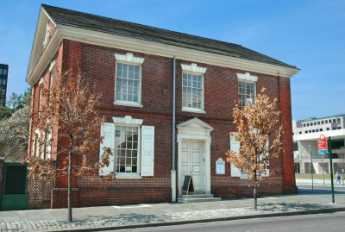
|
| Free Quaker Meetinghouse, Fifth and Arch Streets |
Somewhere in this tradition are allusions to the Free Quakers, Quakers who abandoned the peace testimony to fight the British. There is also the tradition of hostility to British rule which antedates the Revolution and may have some connection to the fanciful contention that their little state was not really part of Penn's colony. Captain (of the City Troop) Sam was a stalwart, possibly the sole founder, of the Gloucester (N.J.) Fox-hunting club. The history is passed down that 22 of the original 26 members of the First City Troop were members of the fox-hunting club, and many if not most were Quakers. The first "Governor" of the State in Schuylkill was Thomas Stretch, but the second Governor, from 1766 until his death, was Captain Sam. He was repeatedly referred to as the life of the club and held in the highest esteem by all. He was "read out" of the main Quaker Meeting, not so much for his drinking as for his flouting of Quaker belief in pacifism. He reputedly led a saber charge at the Battle of Trenton and was a leader of the City Troop in that revolution within a revolution at James Wilson's house, which rescued at least four future signers of the Constitution from a mob of militia which momentarily turned Jacobin.
Naturally, descendants of Quakers on both side of this uproar have been reluctant to say much about it. But somewhere within the history of Samuel Morris must be some important clues about the 18th Century splits within the Quaker Church, to say nothing of the revolt of the three Quaker colonies against British rule.
| Posted by: can we fix it | Dec 7, 2010 7:11 PM |
Great website btw.
| Posted by: ian | Dec 27, 2009 1:22 PM |
| Posted by: stephanie | Dec 10, 2009 10:14 PM |
| Posted by: claudia cocnepcion | Nov 24, 2008 5:26 PM |
| Posted by: Jade | Nov 18, 2008 6:47 PM |
| Posted by: jade | Nov 18, 2008 6:46 PM |
| Posted by: Ramesh | Mar 6, 2008 7:14 AM |
P.S. ROCK ON!!!!!!
| Posted by: bob the builder | Oct 17, 2007 12:13 PM |
34 Blogs
FORCES AT WORK
There are at least three different ways to describe the origins of the American Revolution.
Whatever Was George III Thinking?
 After the loss of his American colonies, George III wrote some rueful but valuable insights.
After the loss of his American colonies, George III wrote some rueful but valuable insights.
Parliament Provokes a Revolution
 King George III personifies what angered the American colonists, but his Ministries acting through Parliament took the actual steps to agitate matters.
King George III personifies what angered the American colonists, but his Ministries acting through Parliament took the actual steps to agitate matters.
Addressing The Proprietors' Dilemma
 King Charles II gave Pennsylvania to William Penn on condition he defends the place and fuss with neighboring states about its boundaries. A century later, it proved more than a private citizen could handle.
King Charles II gave Pennsylvania to William Penn on condition he defends the place and fuss with neighboring states about its boundaries. A century later, it proved more than a private citizen could handle.
Monetary Causes of the American Revolutionary War
 For the only time in our history, the government didn't print enough money, The British found that was just as bad as printing too much,
For the only time in our history, the government didn't print enough money, The British found that was just as bad as printing too much,
Mercantilism Dies Hard
 Diplomacy has been described as war by other means. It's possible to regard both war and diplomacy as economics by other means, a general attitude called mercantilism.
Diplomacy has been described as war by other means. It's possible to regard both war and diplomacy as economics by other means, a general attitude called mercantilism.
Quakerism and the Industrial Revolution
 The Industrial Revolution extended over two centuries and was more important than all the wars, governments, and agitations of its time. Quakerism began at the same time, in the same place. Was that only coincidence?.
The Industrial Revolution extended over two centuries and was more important than all the wars, governments, and agitations of its time. Quakerism began at the same time, in the same place. Was that only coincidence?.
Pennsylvania: Browbeaten Into Joining a War
 America declared Independence on July 4, 1776, but England had decided a year earlier to suppress the rebellion by overwhelming force and announced it six months later. France was then smuggling in gunpowder and guns. But Pacifist Pennsylvania held out until there was a British naval attack in the Delaware River, in May 1776, and a huge army had arrived at New Brunswick in June. The British wanted to confront us with a choice of surrender or subjugation. We picked the third choice the British never considered, to resist until they treated us better.
America declared Independence on July 4, 1776, but England had decided a year earlier to suppress the rebellion by overwhelming force and announced it six months later. France was then smuggling in gunpowder and guns. But Pacifist Pennsylvania held out until there was a British naval attack in the Delaware River, in May 1776, and a huge army had arrived at New Brunswick in June. The British wanted to confront us with a choice of surrender or subjugation. We picked the third choice the British never considered, to resist until they treated us better.
Reconsidering All Our Laws
 The legislatures of America were handed a clean slate for statutes by the 1787 Constitution, and thus given the opportunity to review the entirely legal system. It took nearly a century to accomplish and is still proceeding.
The legislatures of America were handed a clean slate for statutes by the 1787 Constitution, and thus given the opportunity to review the entirely legal system. It took nearly a century to accomplish and is still proceeding.
The Origin of States Rights, a Rumination
The clamor for States Rights probably began with Virginia's claims for western territories.
John Head, His Book of Account, 1718-1753
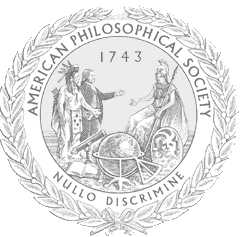 The equivalent of the rosetta stone for colonial commerce had been sitting on George Vaux's shelf for six generations.
The equivalent of the rosetta stone for colonial commerce had been sitting on George Vaux's shelf for six generations.
Tom Paine: Rabble-Rousing Quaker?
 Tom Paine is the one who mainly set the fires of revolution burning, and Franklin sent him here, got him a job, circulated his pamphlets. In spite of Franklin's sponsorship, Washington would cross the street to avoid Paine, and fellow Quakers would have no part of his violence. His later life showed him to be a rebel without a cause.
Tom Paine is the one who mainly set the fires of revolution burning, and Franklin sent him here, got him a job, circulated his pamphlets. In spite of Franklin's sponsorship, Washington would cross the street to avoid Paine, and fellow Quakers would have no part of his violence. His later life showed him to be a rebel without a cause.
Caesar Rodney Rides Through the Rain
 When it looked as though Delaware was wavering on the Declaration of Independence, Caesar Rodney was summoned to ride through the rain to cast a deciding vote, in spite of advanced cancer of his jaw.
When it looked as though Delaware was wavering on the Declaration of Independence, Caesar Rodney was summoned to ride through the rain to cast a deciding vote, in spite of advanced cancer of his jaw.
Franklin Declares Independence a Year Early
 Franklin made no secret of his goal of national independence, at least a year before the Continental Congress voted and Thomas Jefferson composed his rather rambling declaration.
Franklin made no secret of his goal of national independence, at least a year before the Continental Congress voted and Thomas Jefferson composed his rather rambling declaration.
George Washington's View of the British Army
 Washington's escape from Braddock's defeat may help us understand his future low opinion of the British Army, and possibly suggests a reason for his hating them.
Washington's escape from Braddock's defeat may help us understand his future low opinion of the British Army, and possibly suggests a reason for his hating them.
Poor Richard Plays Hardball
 While aristocratic England gave him a public drubbing, Franklin stood silently before them and thought it all over. At that moment, the American decision was made to declare independence.
While aristocratic England gave him a public drubbing, Franklin stood silently before them and thought it all over. At that moment, the American decision was made to declare independence.
Two Hotheads May Have Destroyed an Empire
 Charles Townshend and William Bradford were separated by an ocean, and surely never met. But if any two people can be said to have deliberately provoked the American Revolution, these two must be considered.
Charles Townshend and William Bradford were separated by an ocean, and surely never met. But if any two people can be said to have deliberately provoked the American Revolution, these two must be considered.
Differences of Quaker Opinion
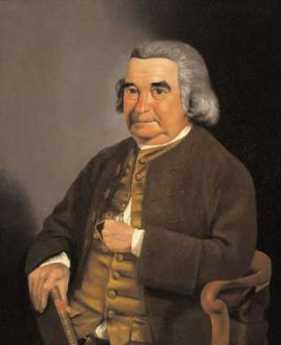 Some Quakers refused to go along with the abolition of slavery. That was particularly true in Newport, RI, the North American point of the triangular slave trade.
Some Quakers refused to go along with the abolition of slavery. That was particularly true in Newport, RI, the North American point of the triangular slave trade.
John Dickinson, Quaker Hamlet
 John Dickinson was the most respected lawyer and politician of his time. He had a lot to do with writing the Declaration of Independence but refused to sign it.
John Dickinson was the most respected lawyer and politician of his time. He had a lot to do with writing the Declaration of Independence but refused to sign it.
Pennsylvania Likes Private Property Private
 The King used to own the whole country. William Penn got us used to the idea that my property is mine, not the King's.
The King used to own the whole country. William Penn got us used to the idea that my property is mine, not the King's.
Restoring the Gold Standard by Levering Judges' Salaries
 Advocates of a gold standard may just have found an effective "gotcha".
Advocates of a gold standard may just have found an effective "gotcha".
The Stamp Tax: Highly Innovative, Much Underestimated
Foreground: Parliament Irks the Colonial Merchants
 The Townshend Acts, upsetting trade and hated by Americans, bordered on economic warfare. The British tested tea, stamps and manufactures, but the most effective economic pressure points proved to be paper money and gunpowder. The Americans reacted to all this as second-class citizenship.
The Townshend Acts, upsetting trade and hated by Americans, bordered on economic warfare. The British tested tea, stamps and manufactures, but the most effective economic pressure points proved to be paper money and gunpowder. The Americans reacted to all this as second-class citizenship.
Lexington, Concord, and All That
 What was the point of declaring independence, when the colonies had already been at war with England for over a year?
What was the point of declaring independence, when the colonies had already been at war with England for over a year?
Circular Letter: Boston Committee of Correspondance, May 1774
 Paul Revere hand-delivered a circular letter from Boston appealing for Philadelphia participation in a boycott of British goods. This letter had a significant effect on Philadelphia opinion.
Paul Revere hand-delivered a circular letter from Boston appealing for Philadelphia participation in a boycott of British goods. This letter had a significant effect on Philadelphia opinion.
Declaration of Rights of the Continental Congress, October 14, 1774
 .
.
Unalienable Rights Before 1776
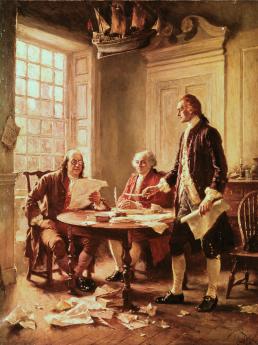 Lawyers commonly say the Declaration of Independence "informs" the Constitution. But prior informing was performed by William Penn, the Roman Empire, and Hammurabi.
Lawyers commonly say the Declaration of Independence "informs" the Constitution. But prior informing was performed by William Penn, the Roman Empire, and Hammurabi.
Three Revolutions at Once, Maybe Four
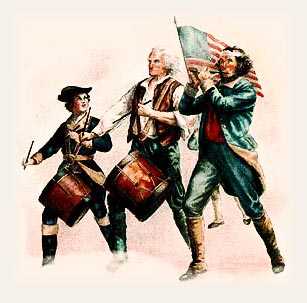 Asking the cause of the American Revolutionary War may be a little simplistic; civil wars pop up, all over the place, all the time. The more important question to ask, is why did this American Revolution have such a dramatic effect on the whole world?
Asking the cause of the American Revolutionary War may be a little simplistic; civil wars pop up, all over the place, all the time. The more important question to ask, is why did this American Revolution have such a dramatic effect on the whole world?
Philadelphia in '76
 There were about 30,000 residents, the size of a small town, but it was the second largest city in the English-speaking world. Aside from wagons, there were thirty wheeled vehicles.
There were about 30,000 residents, the size of a small town, but it was the second largest city in the English-speaking world. Aside from wagons, there were thirty wheeled vehicles.
What Happened in Philadelphia on July 4, 1776?
 There were about 30,000 residents, just a small town, but it was the second largest city in the English-speaking world. Aside from wagons, there were thirty wheeled vehicles. But this is the town where decisions were made.
There were about 30,000 residents, just a small town, but it was the second largest city in the English-speaking world. Aside from wagons, there were thirty wheeled vehicles. But this is the town where decisions were made.
Grand Union
 Thirteen stars and stripes became the National Flag in 1777, but a rather similar flag was the National flag from 1775-1777. It was also designed by a Philadelphia milliner, Margaret Manny.
Thirteen stars and stripes became the National Flag in 1777, but a rather similar flag was the National flag from 1775-1777. It was also designed by a Philadelphia milliner, Margaret Manny.
State in Schuylkill Fishing Club
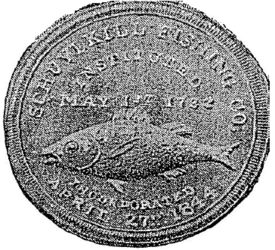 Unless you listen to some quibbles from White's in London, the Schuylkill Fishing Club of the State in Schuylkill is the oldest organized men's club in the world. And even if that exception is admitted, it's the oldest men's club in America. It's no secret, but it's very private.
Unless you listen to some quibbles from White's in London, the Schuylkill Fishing Club of the State in Schuylkill is the oldest organized men's club in the world. And even if that exception is admitted, it's the oldest men's club in America. It's no secret, but it's very private.